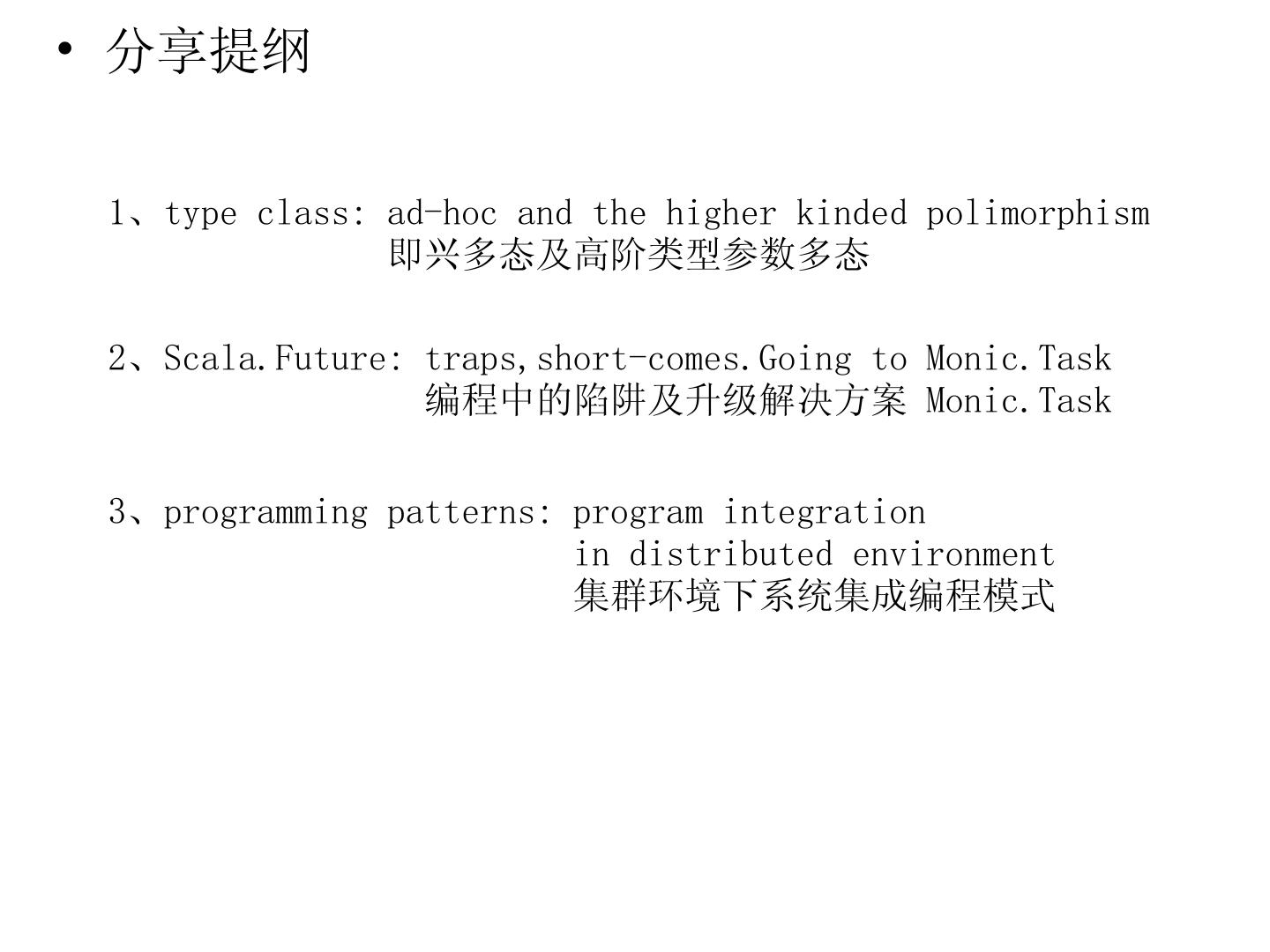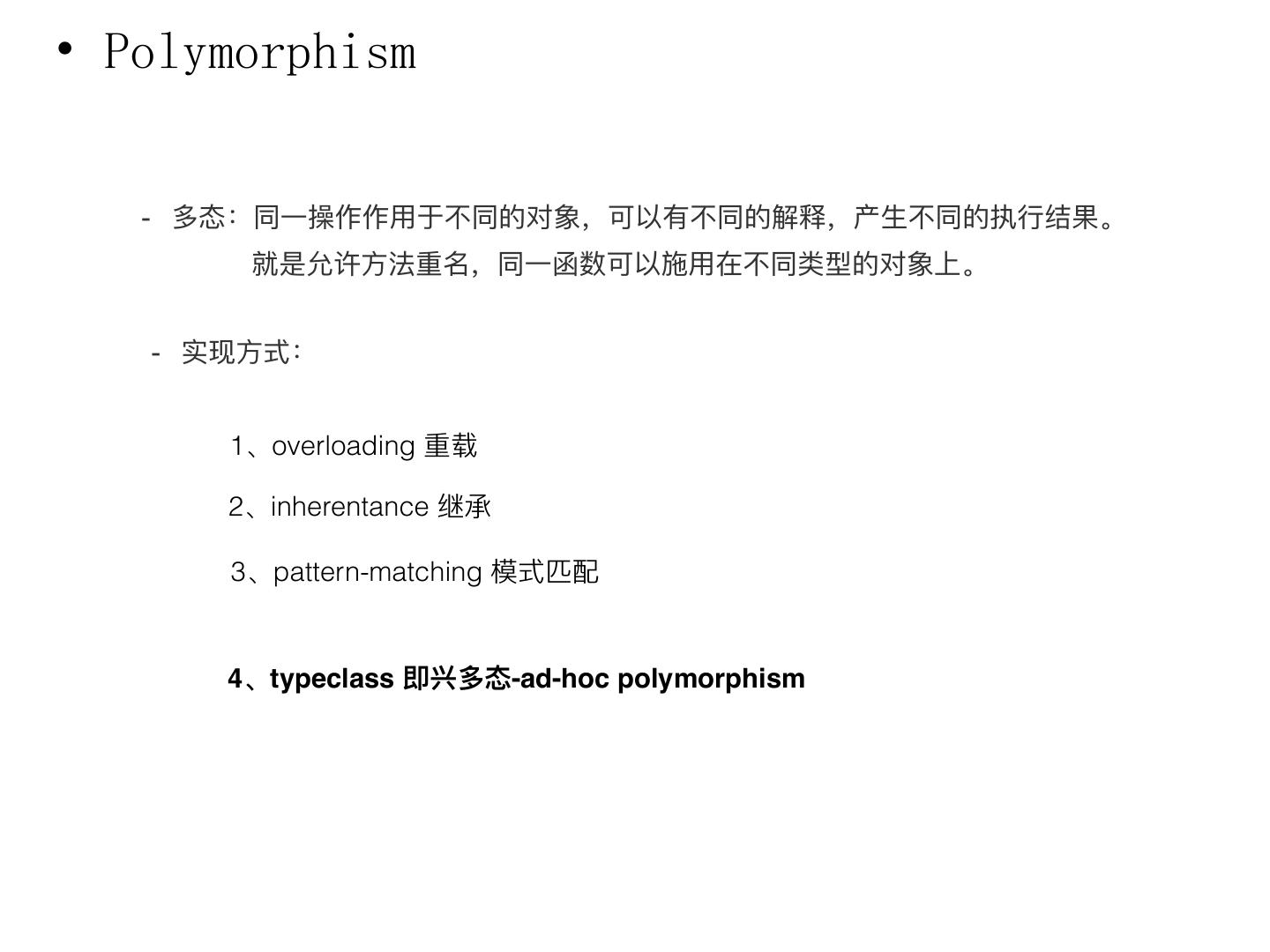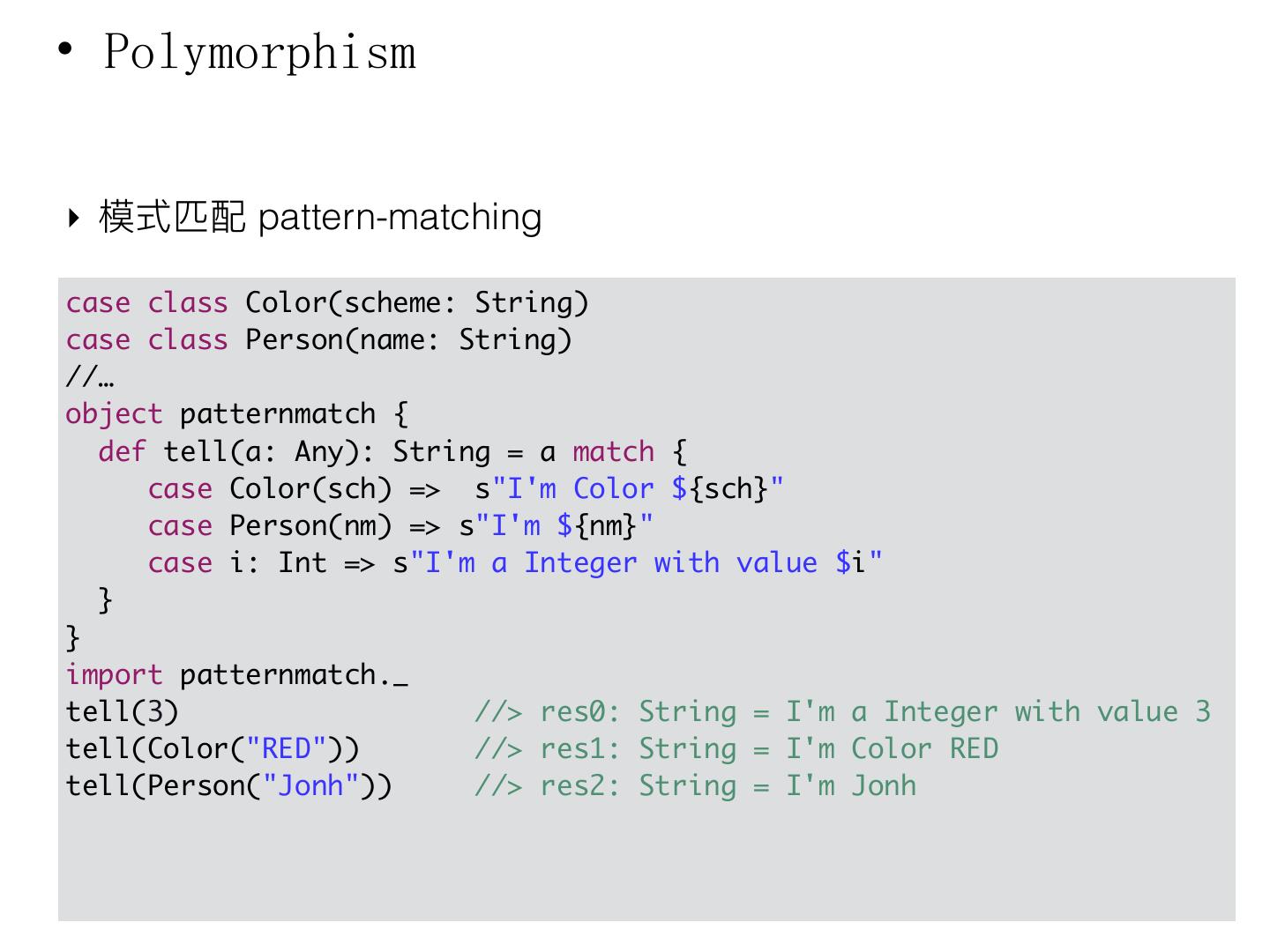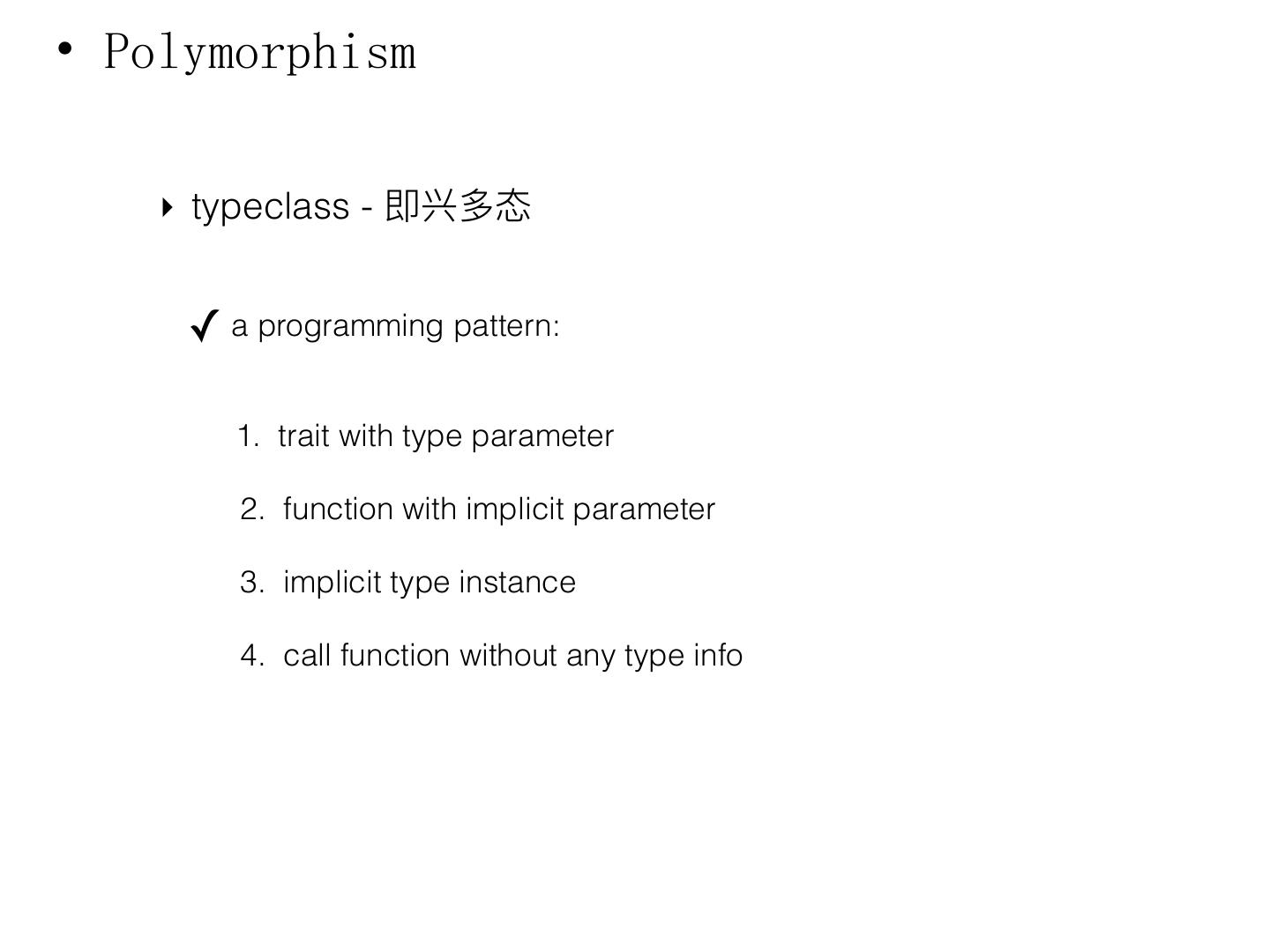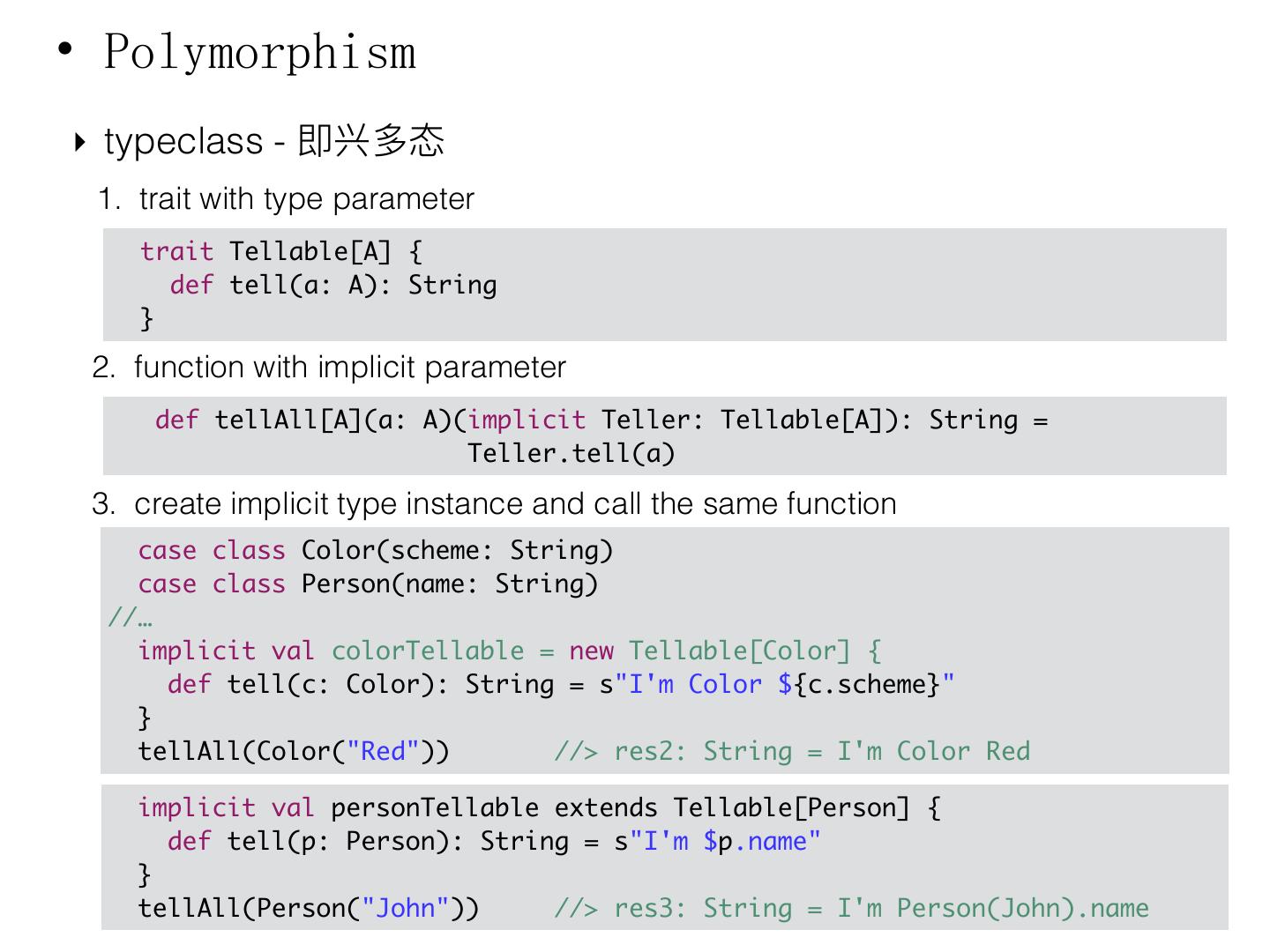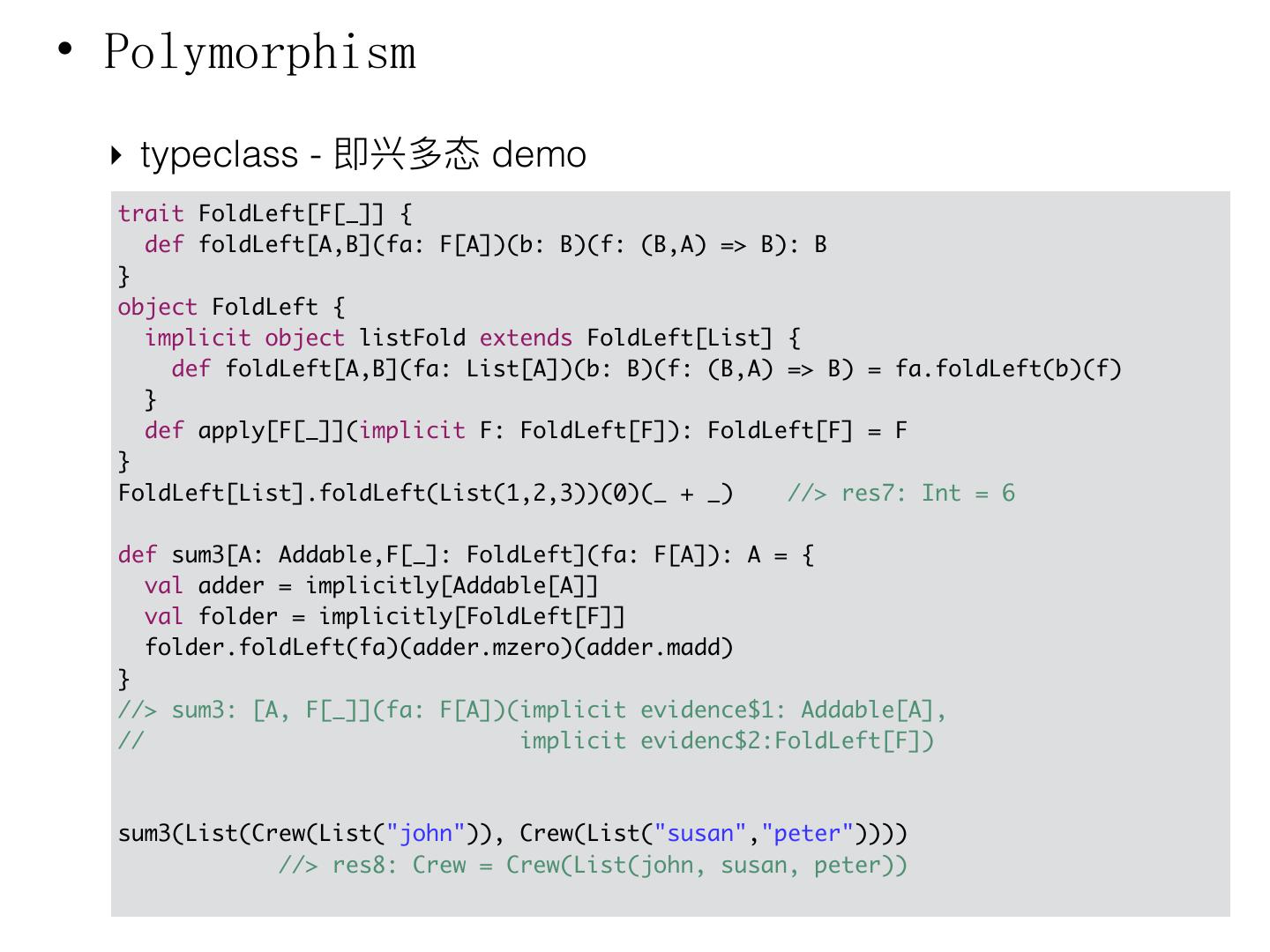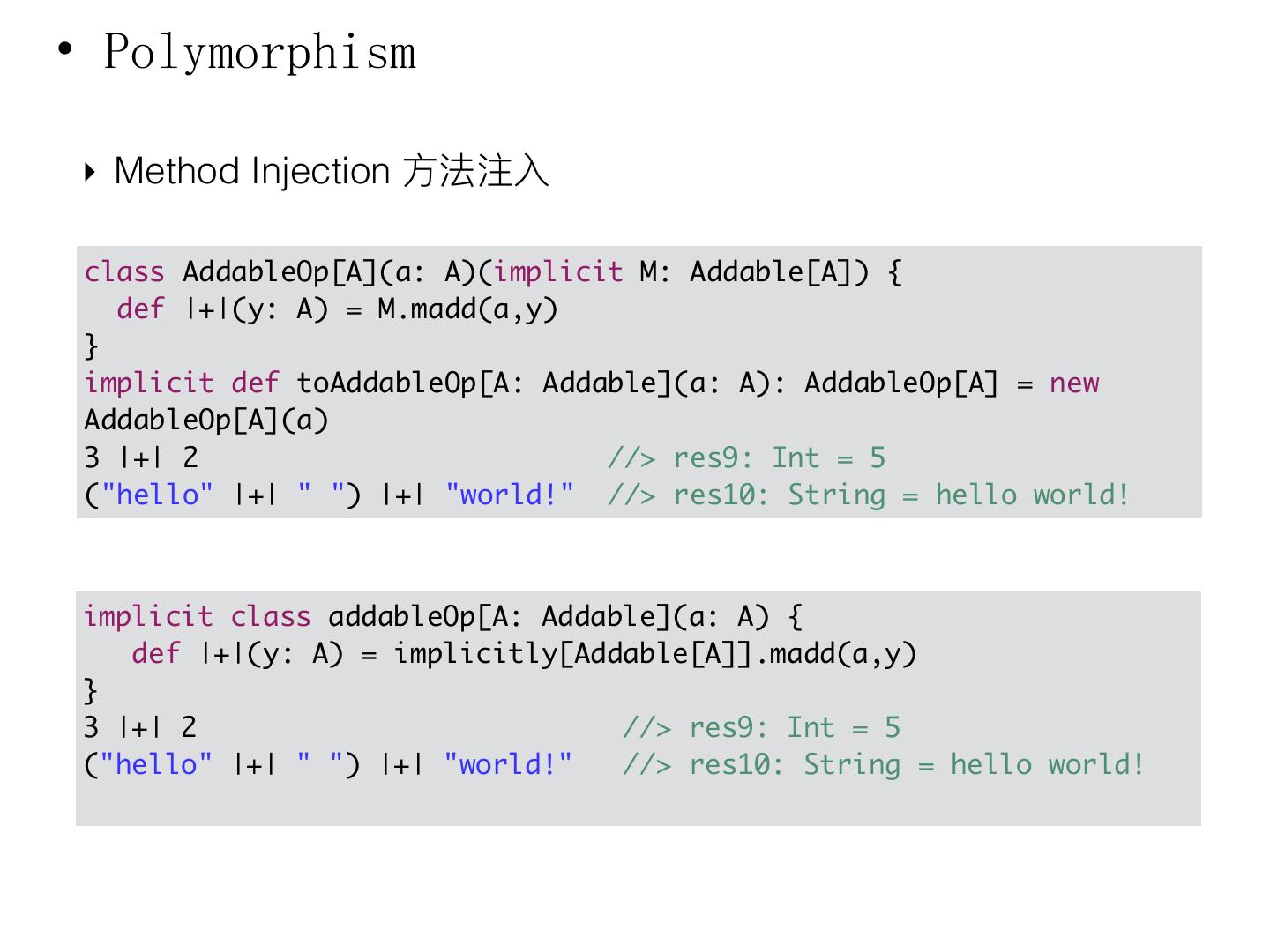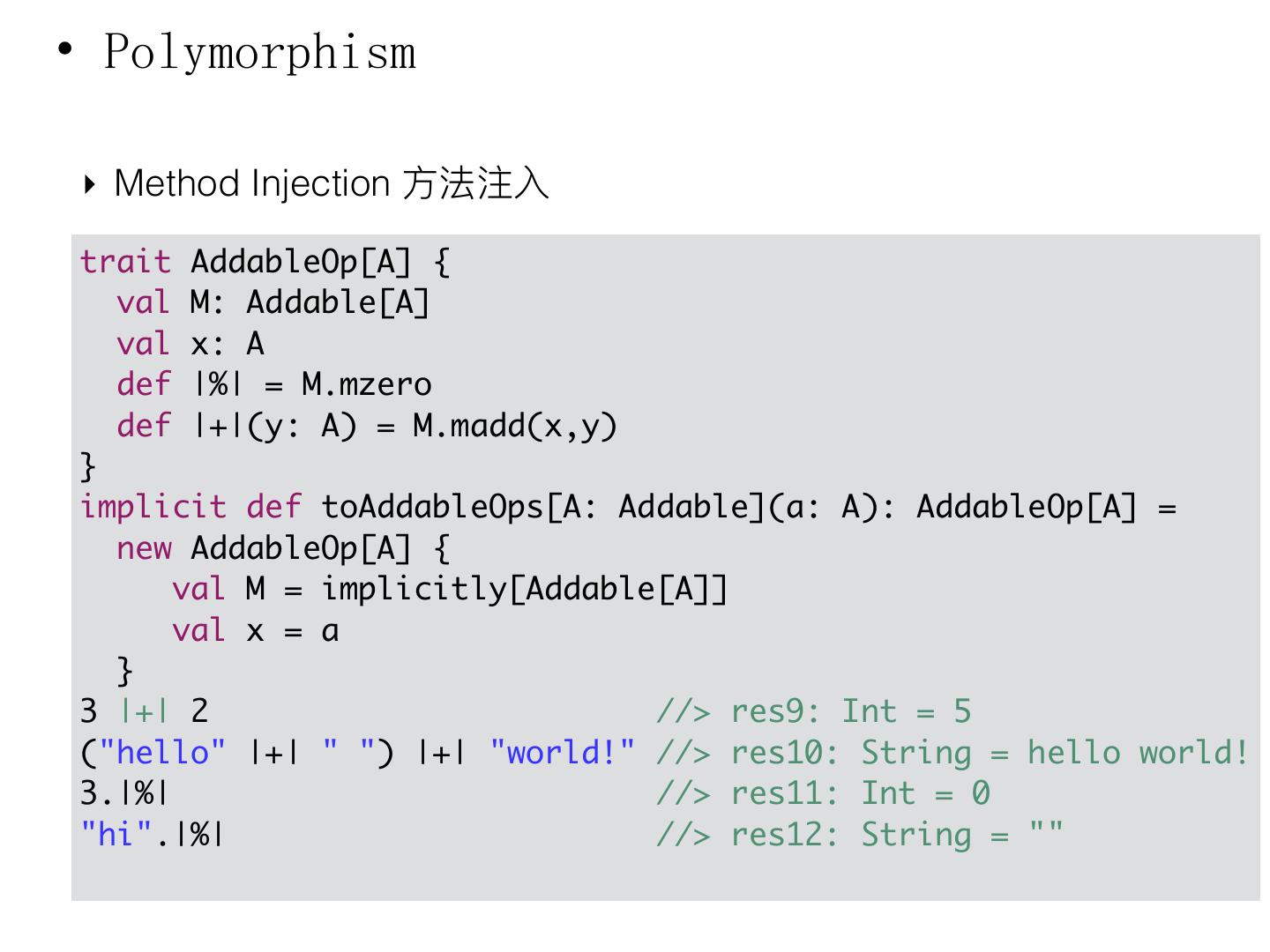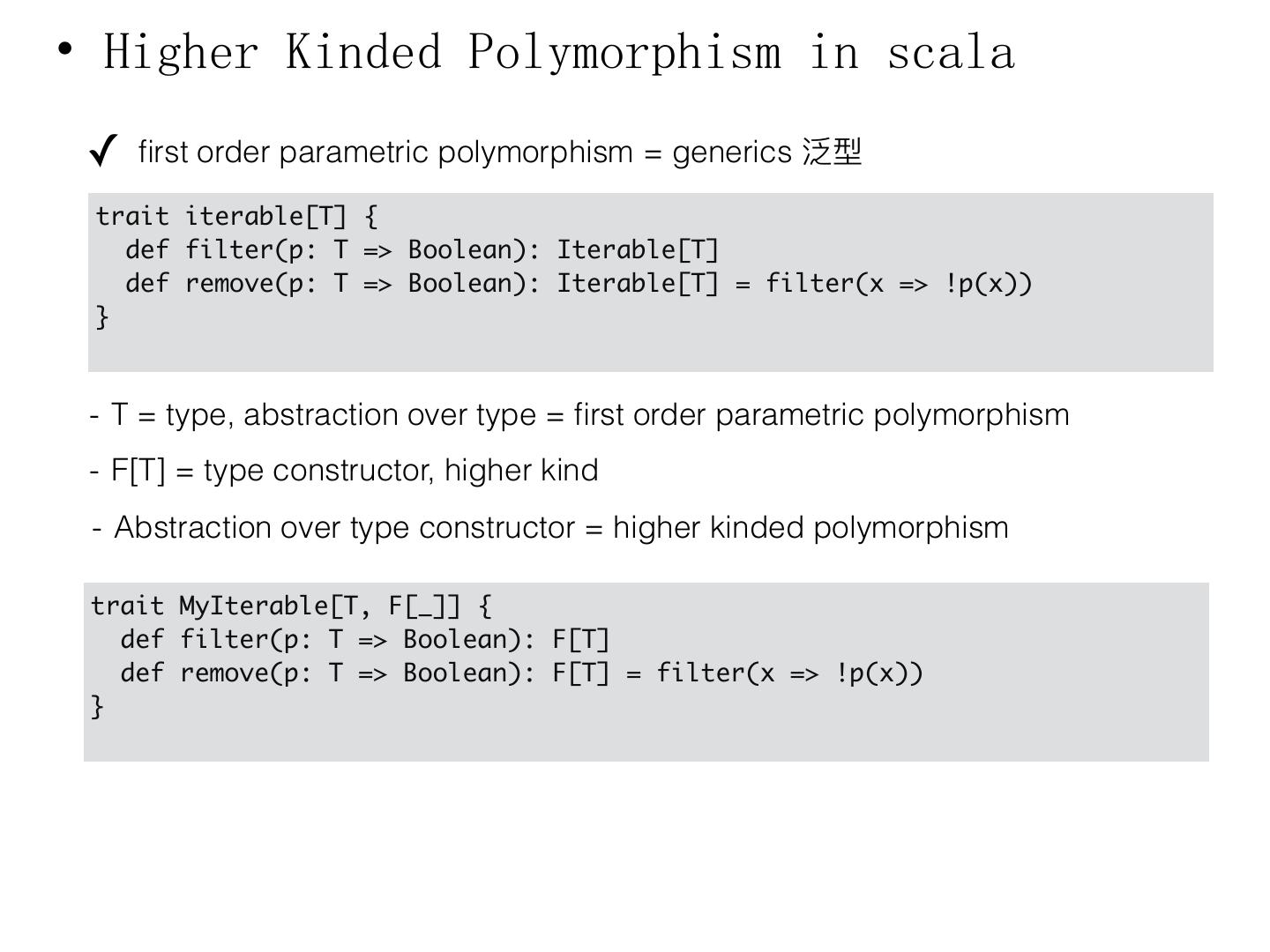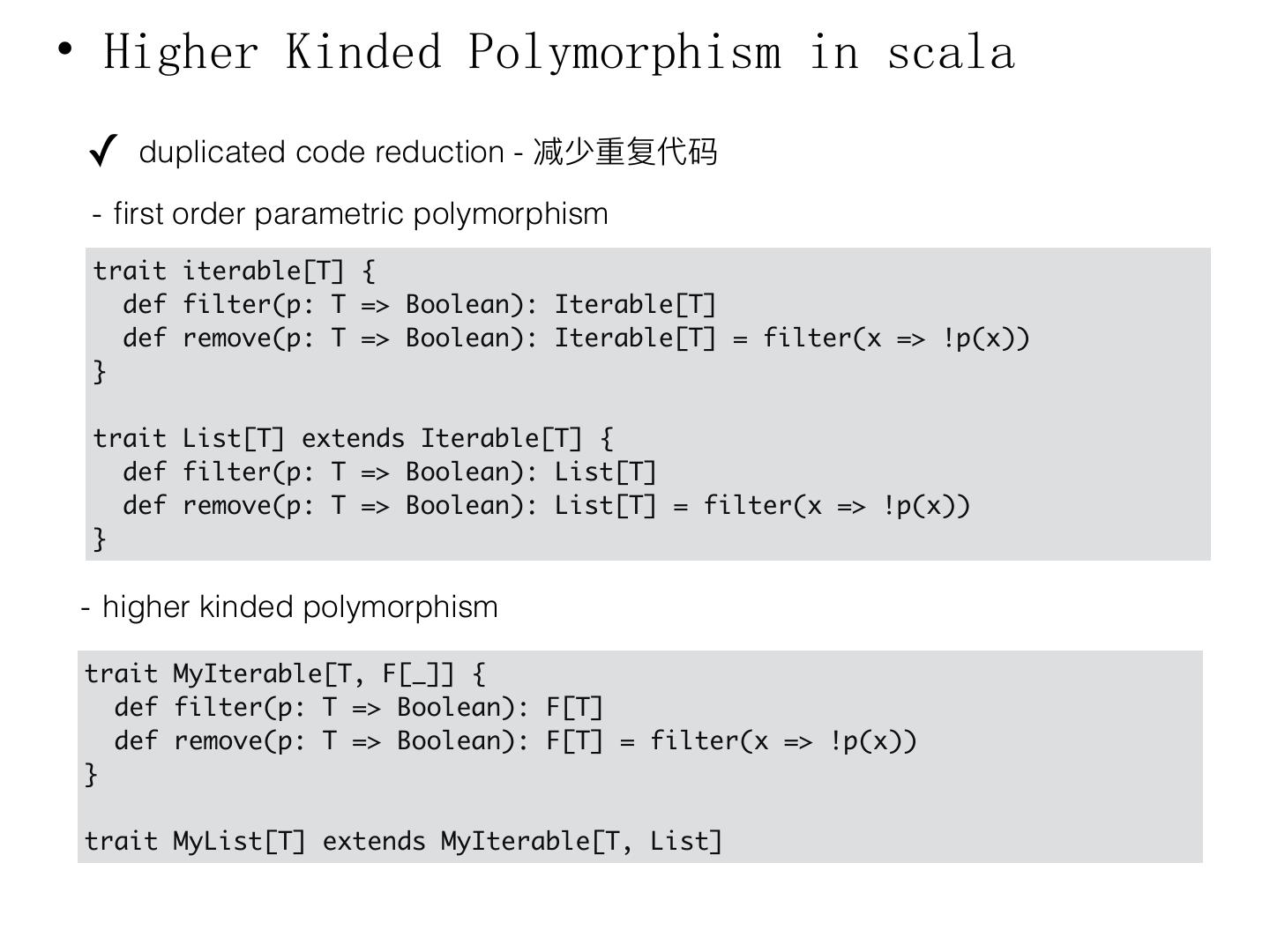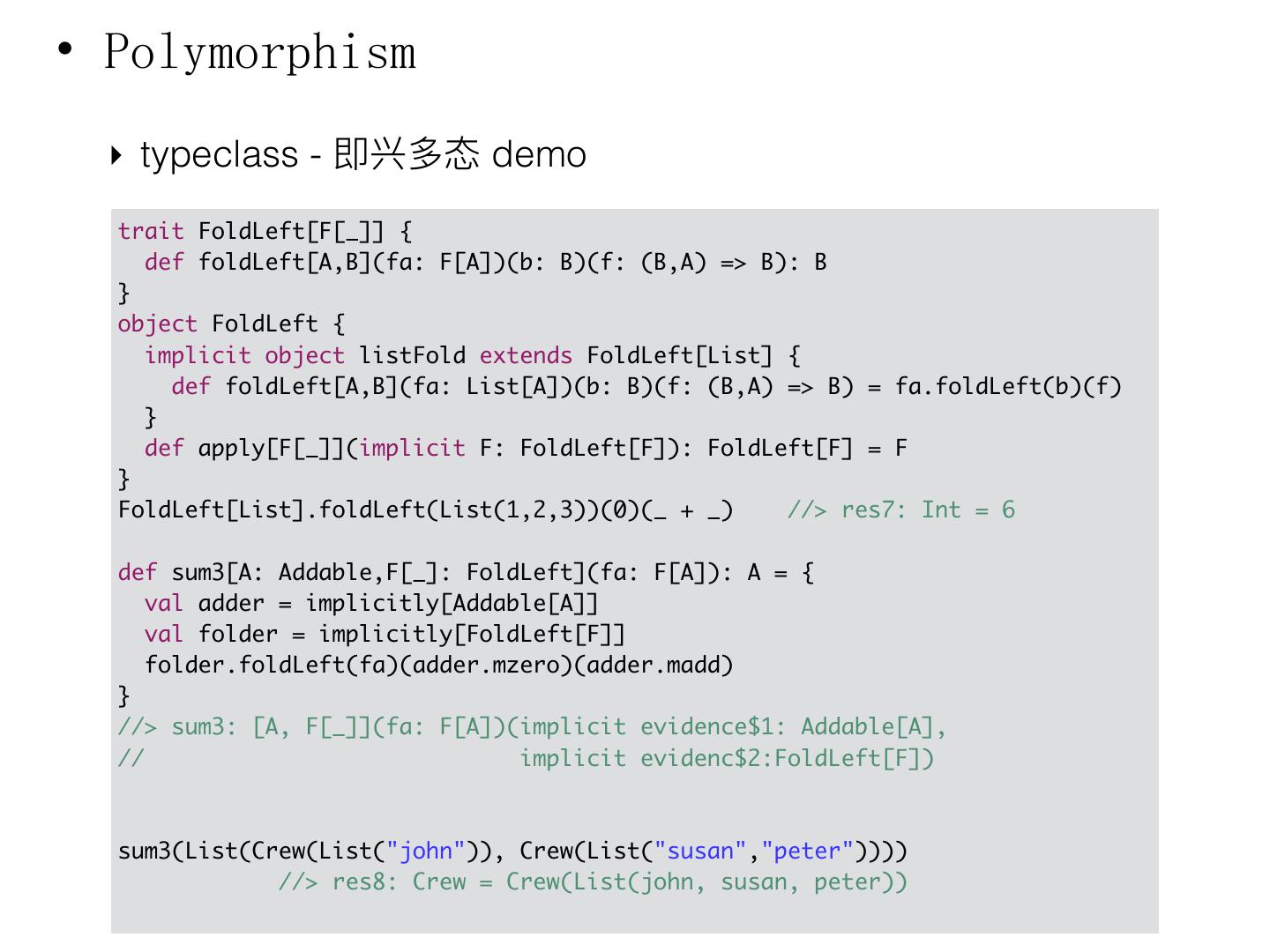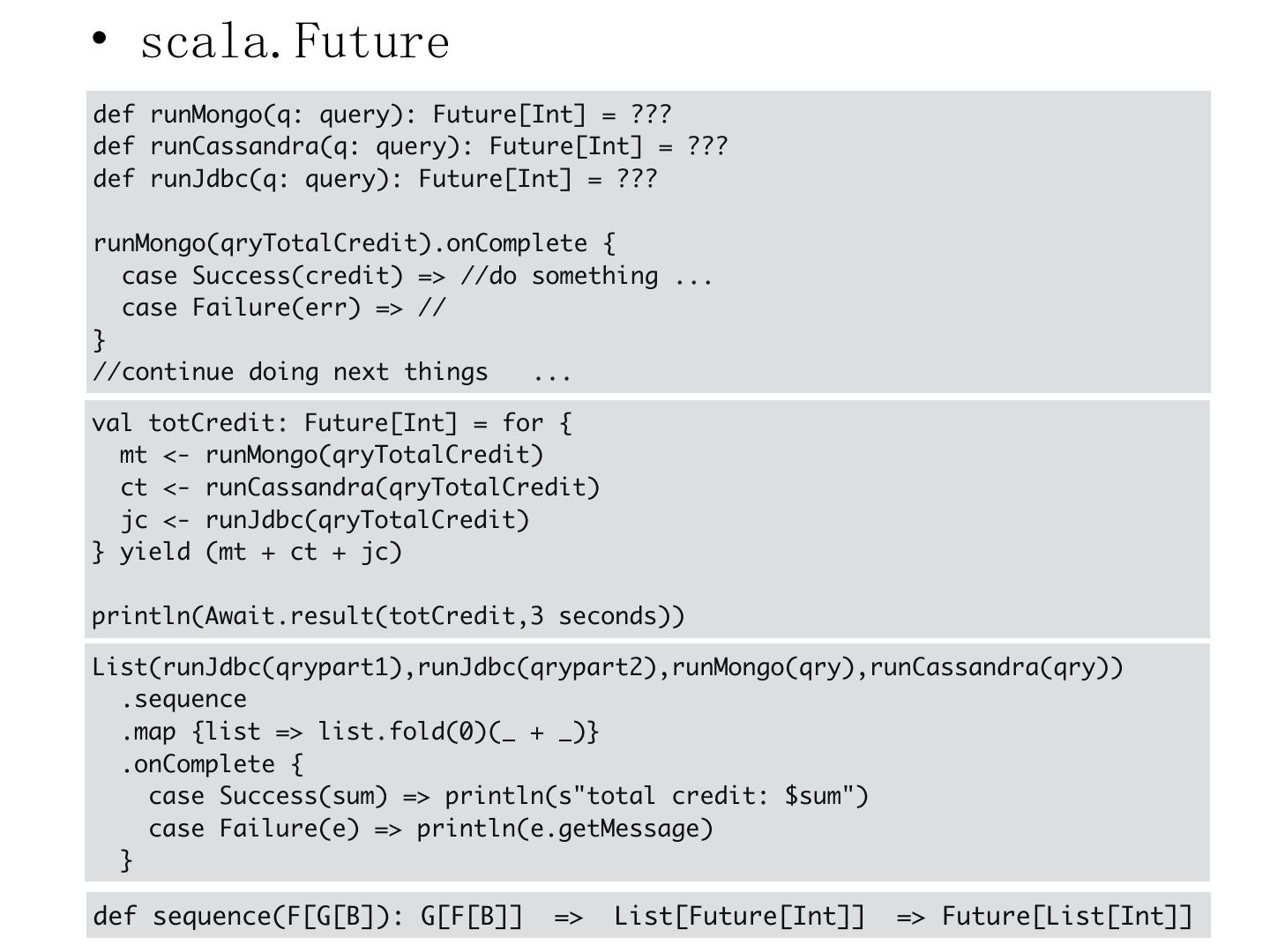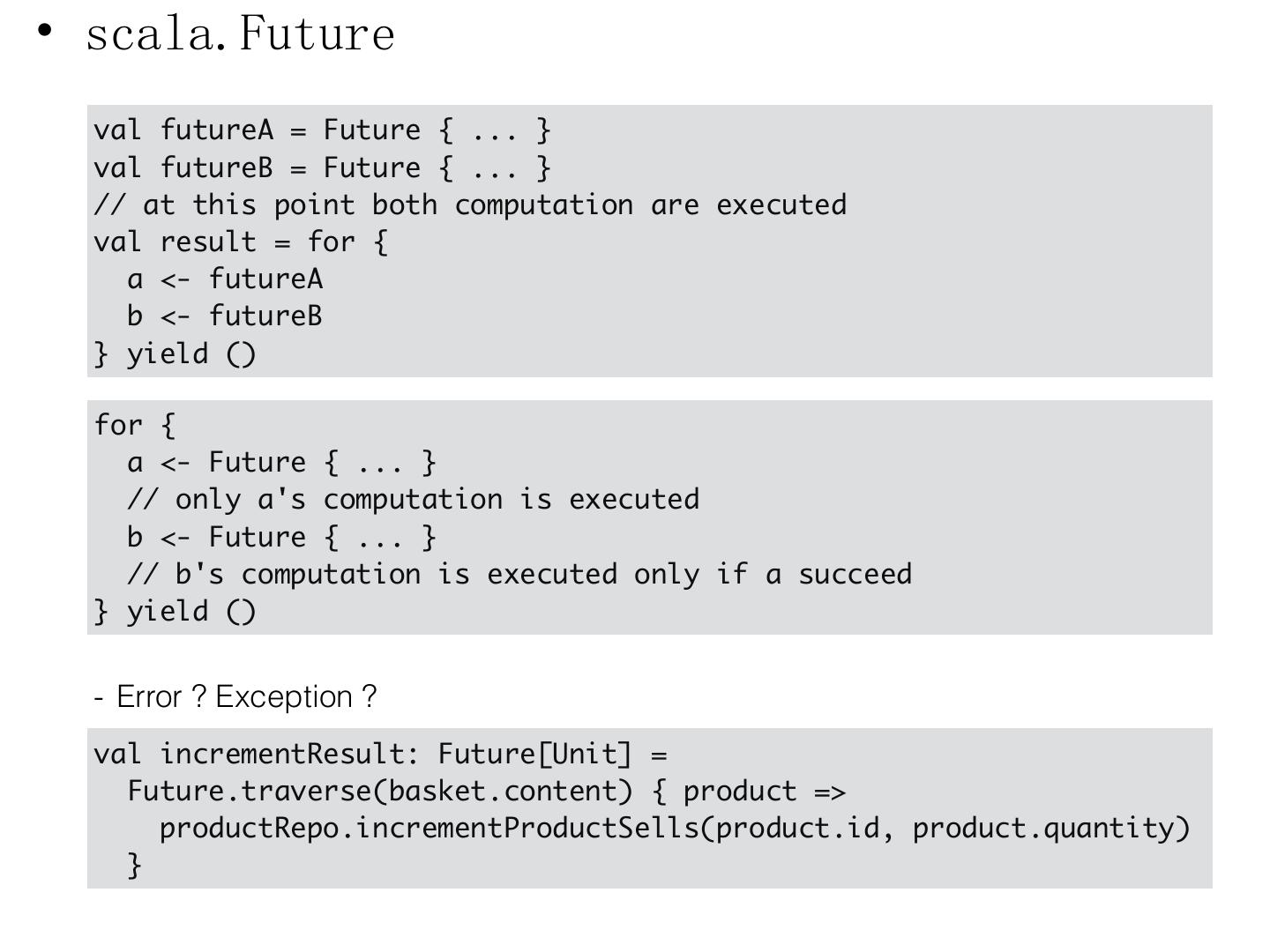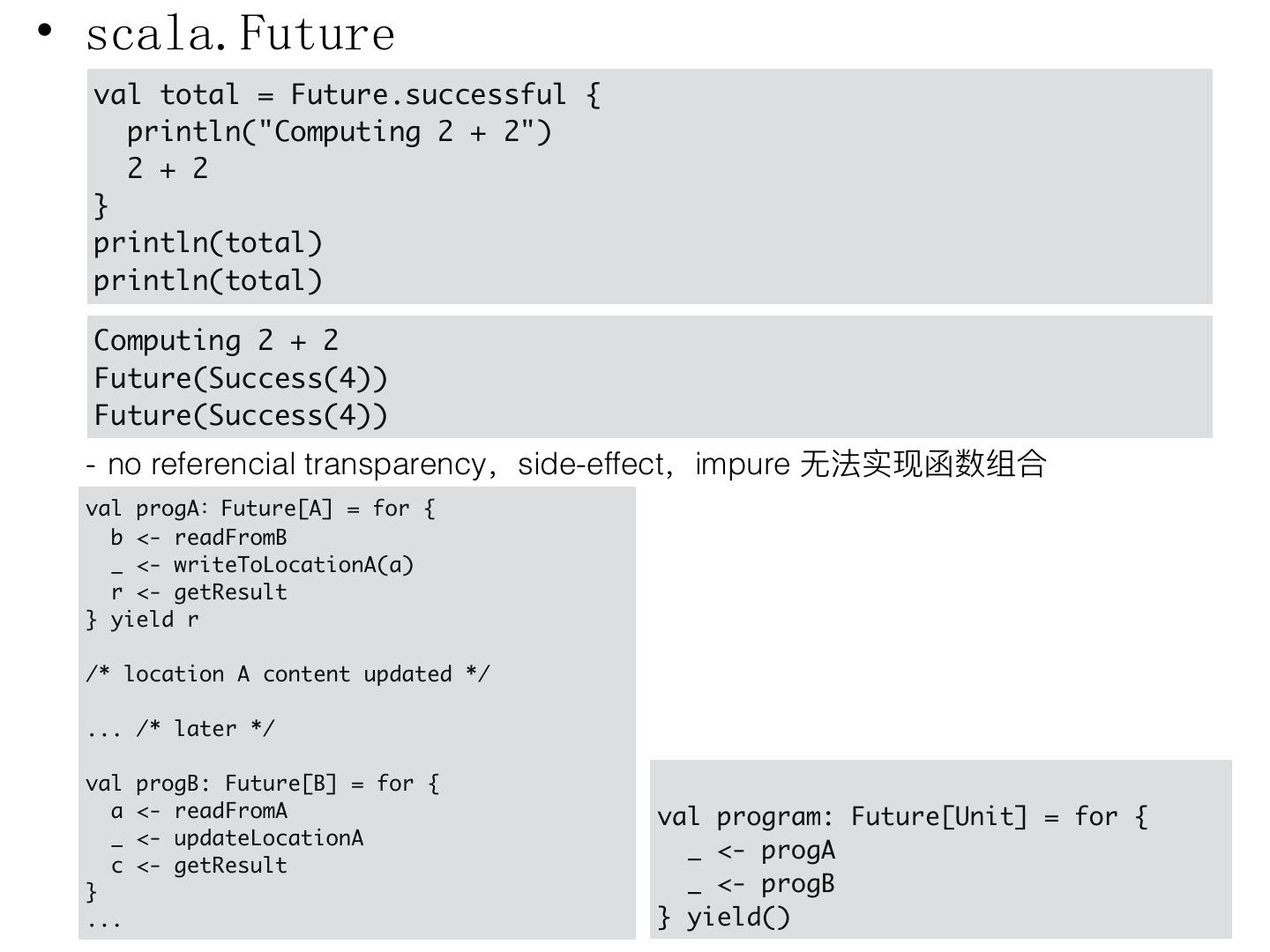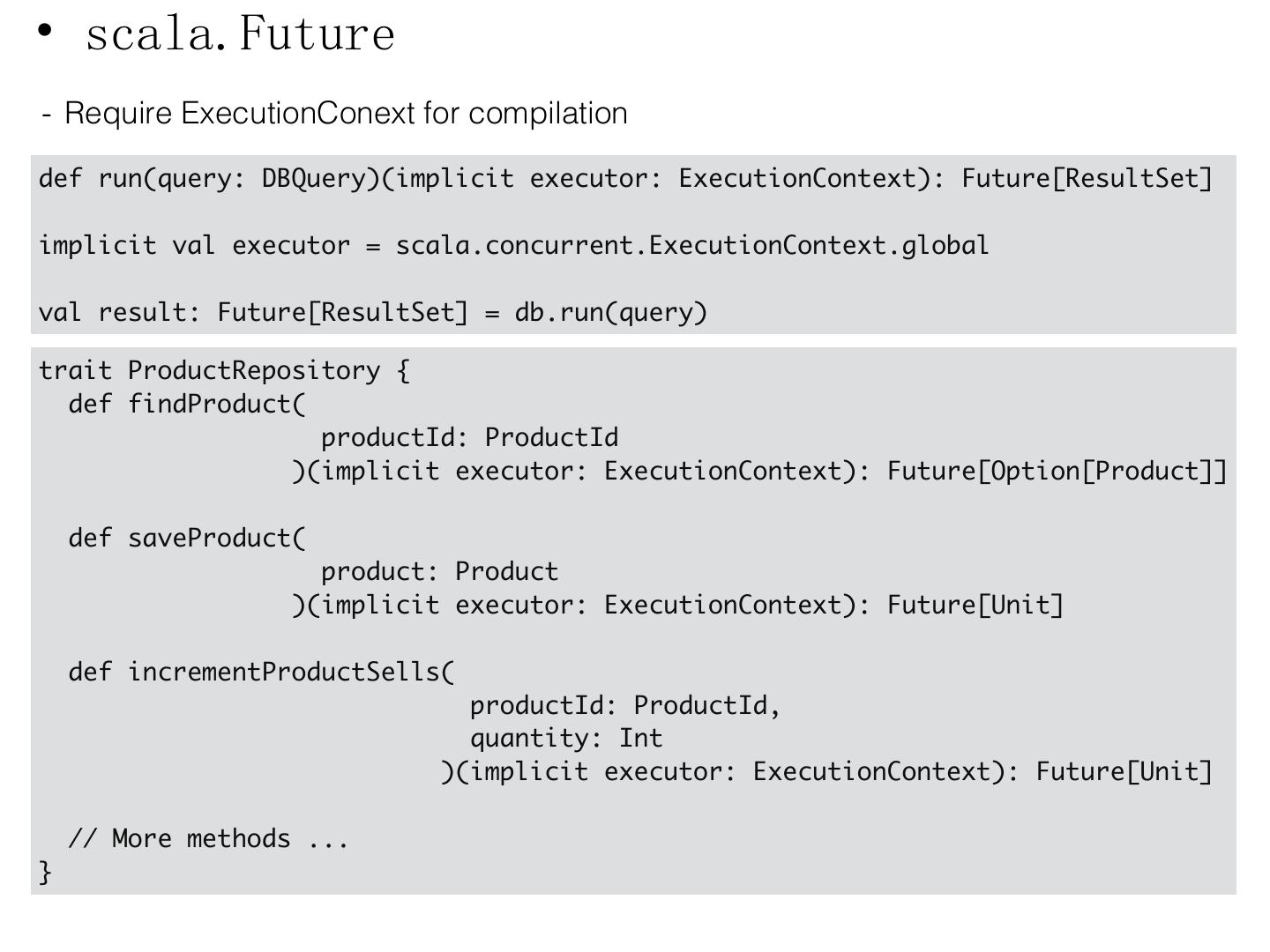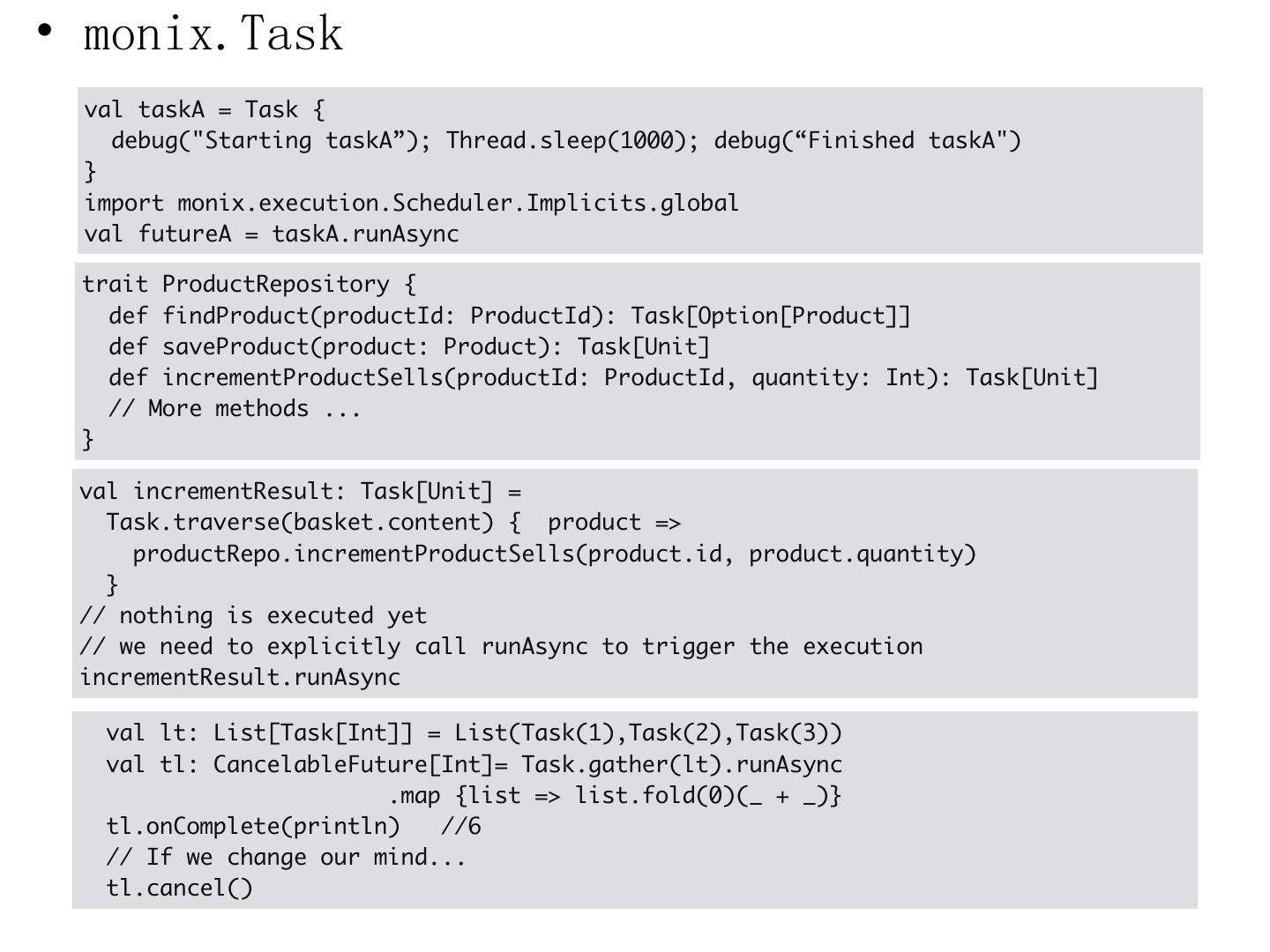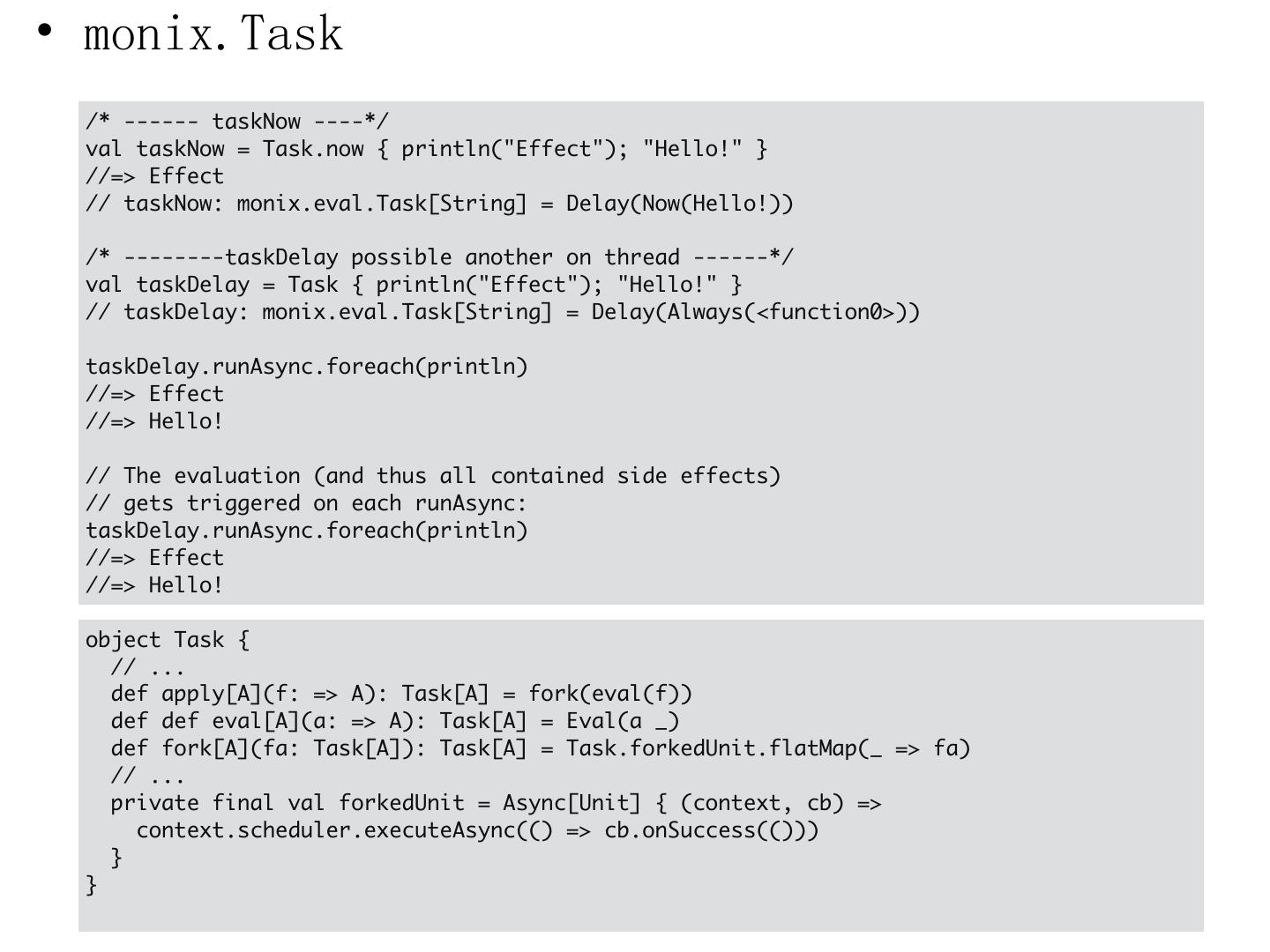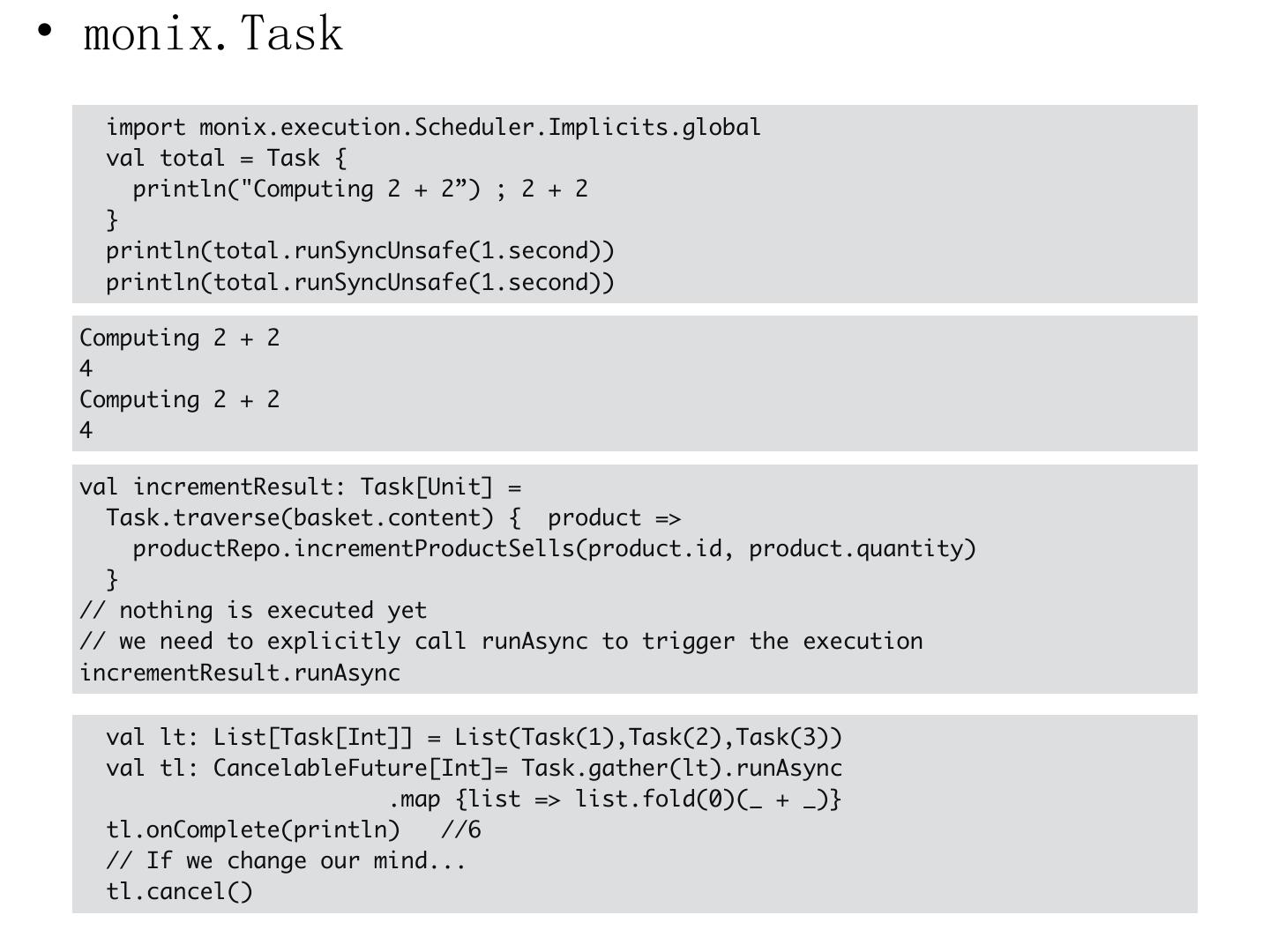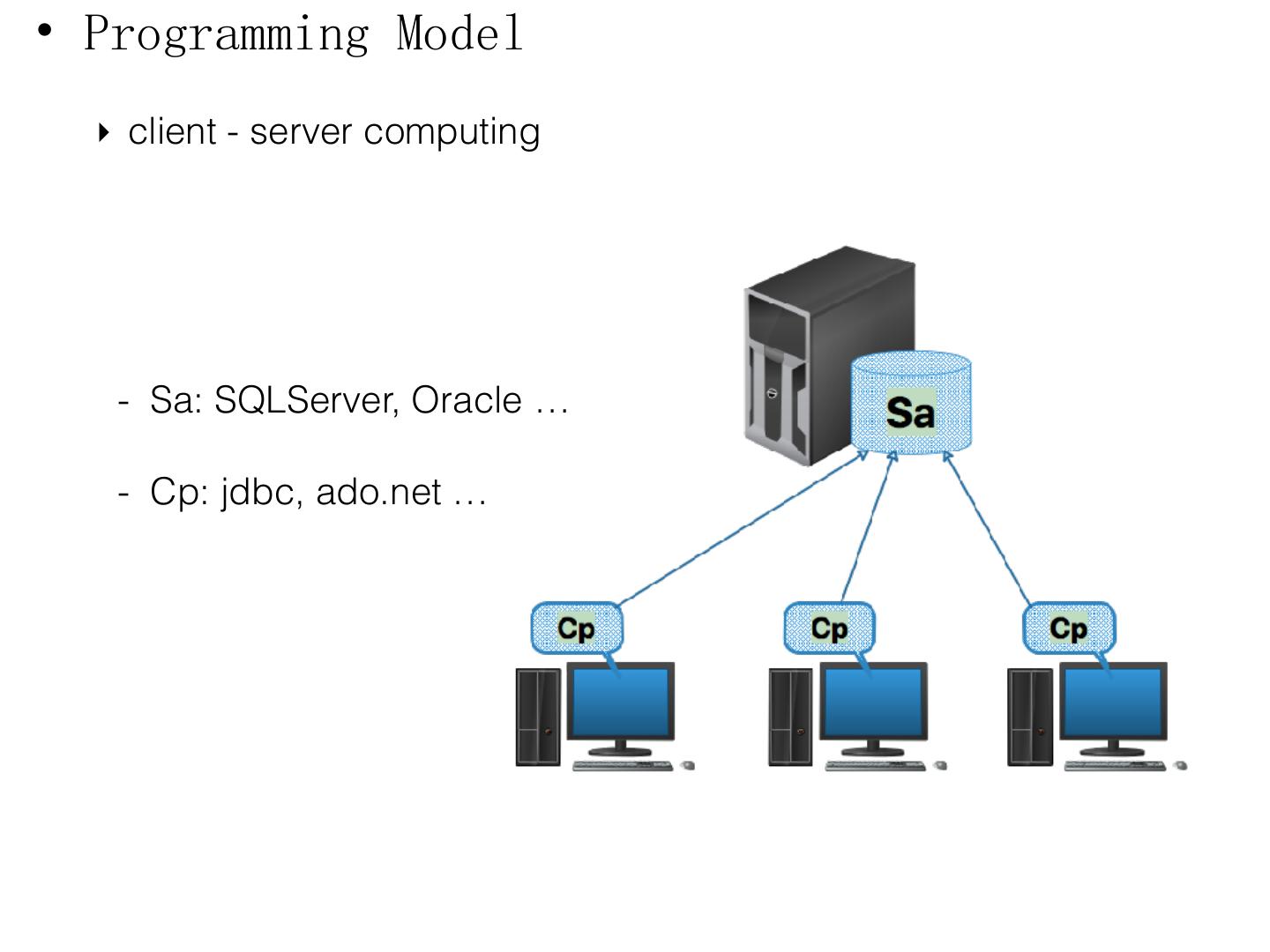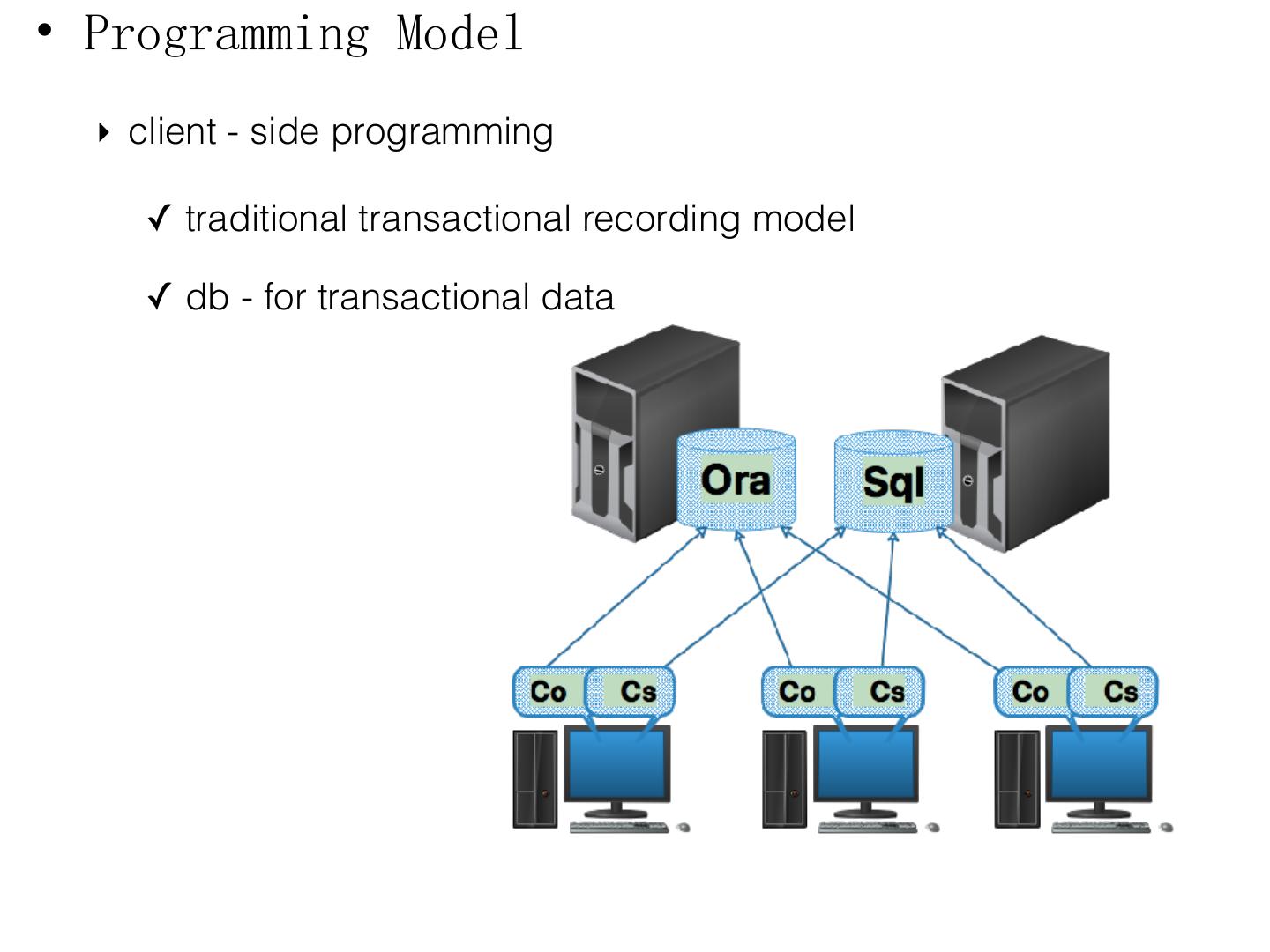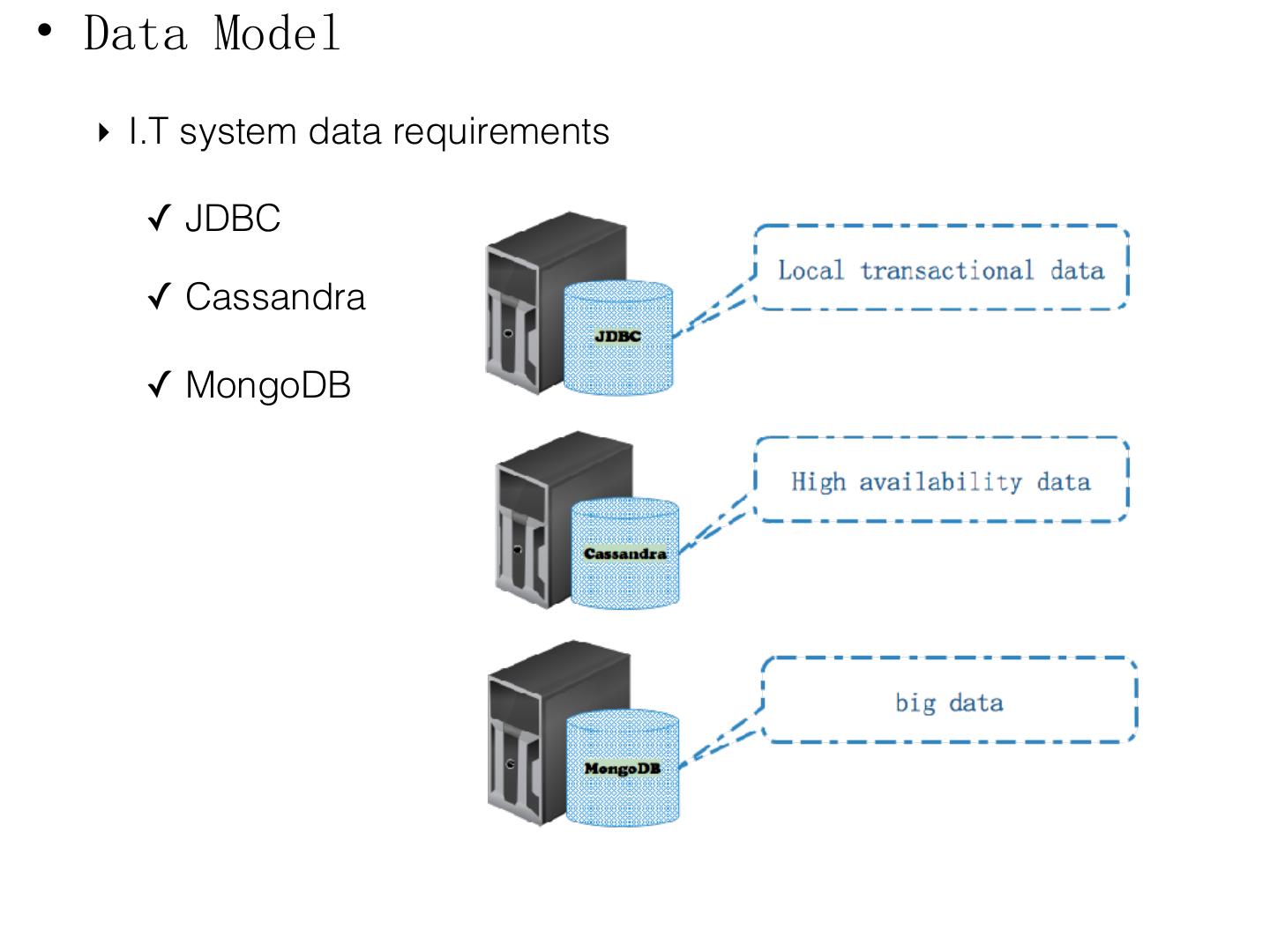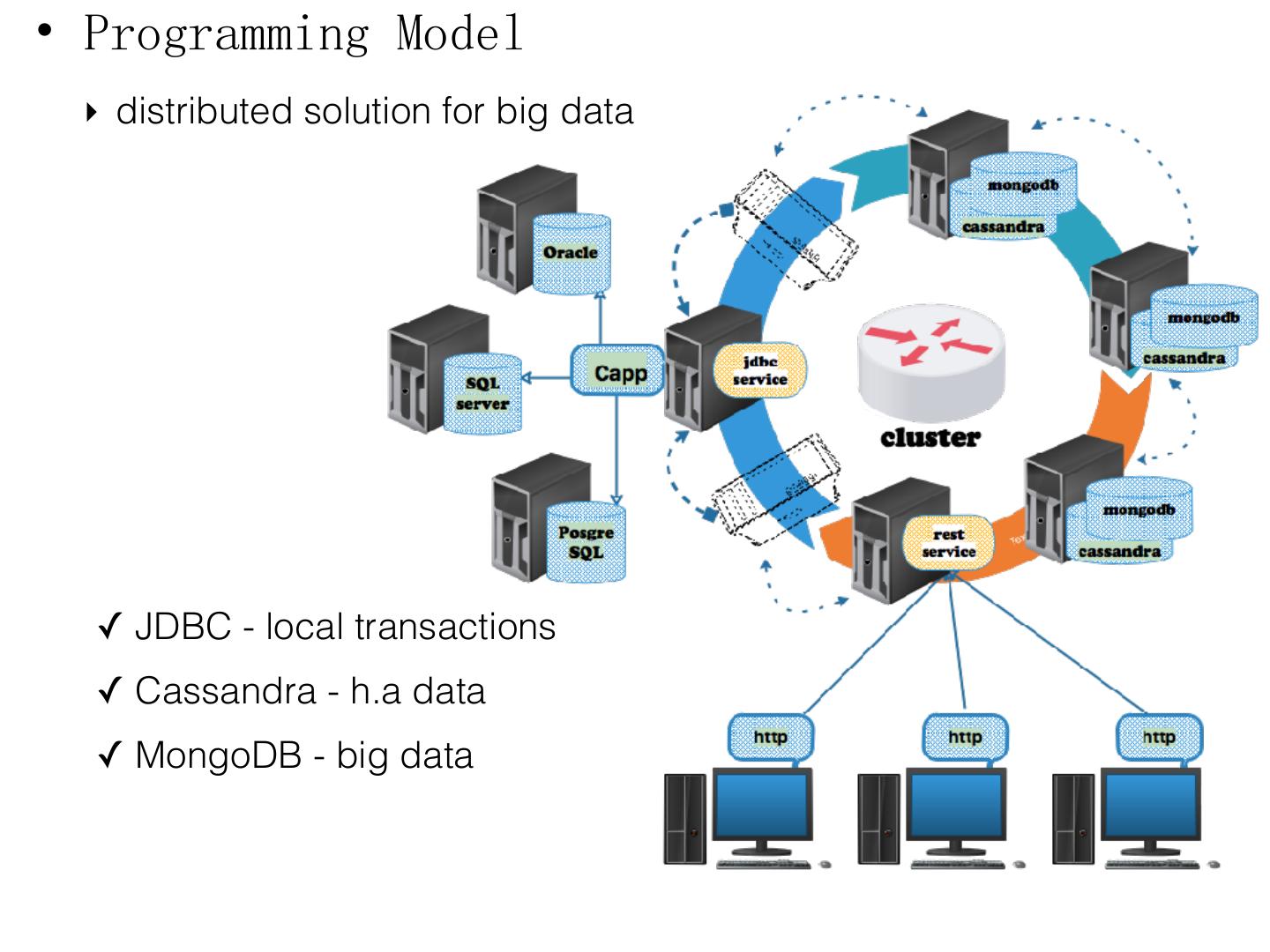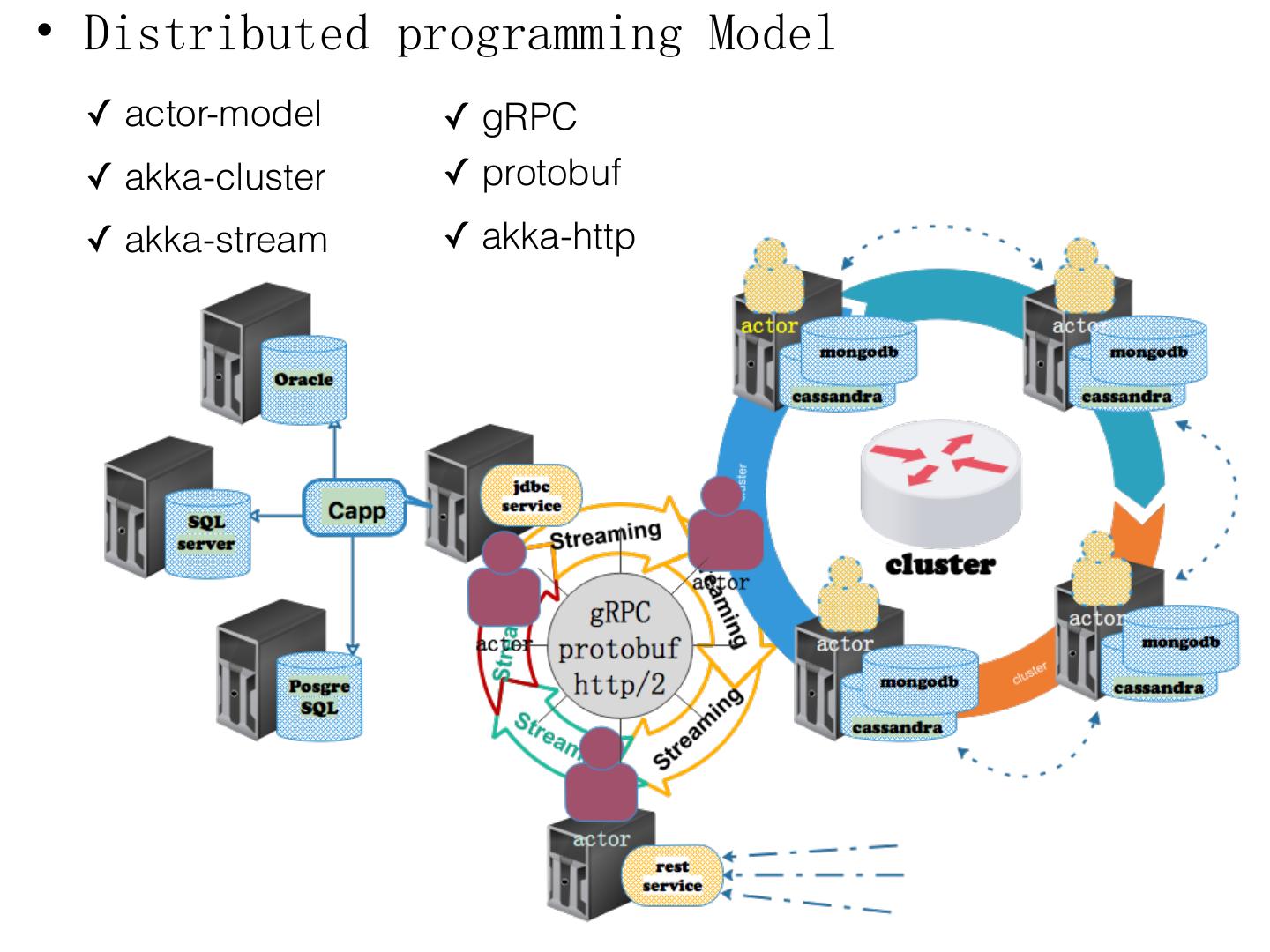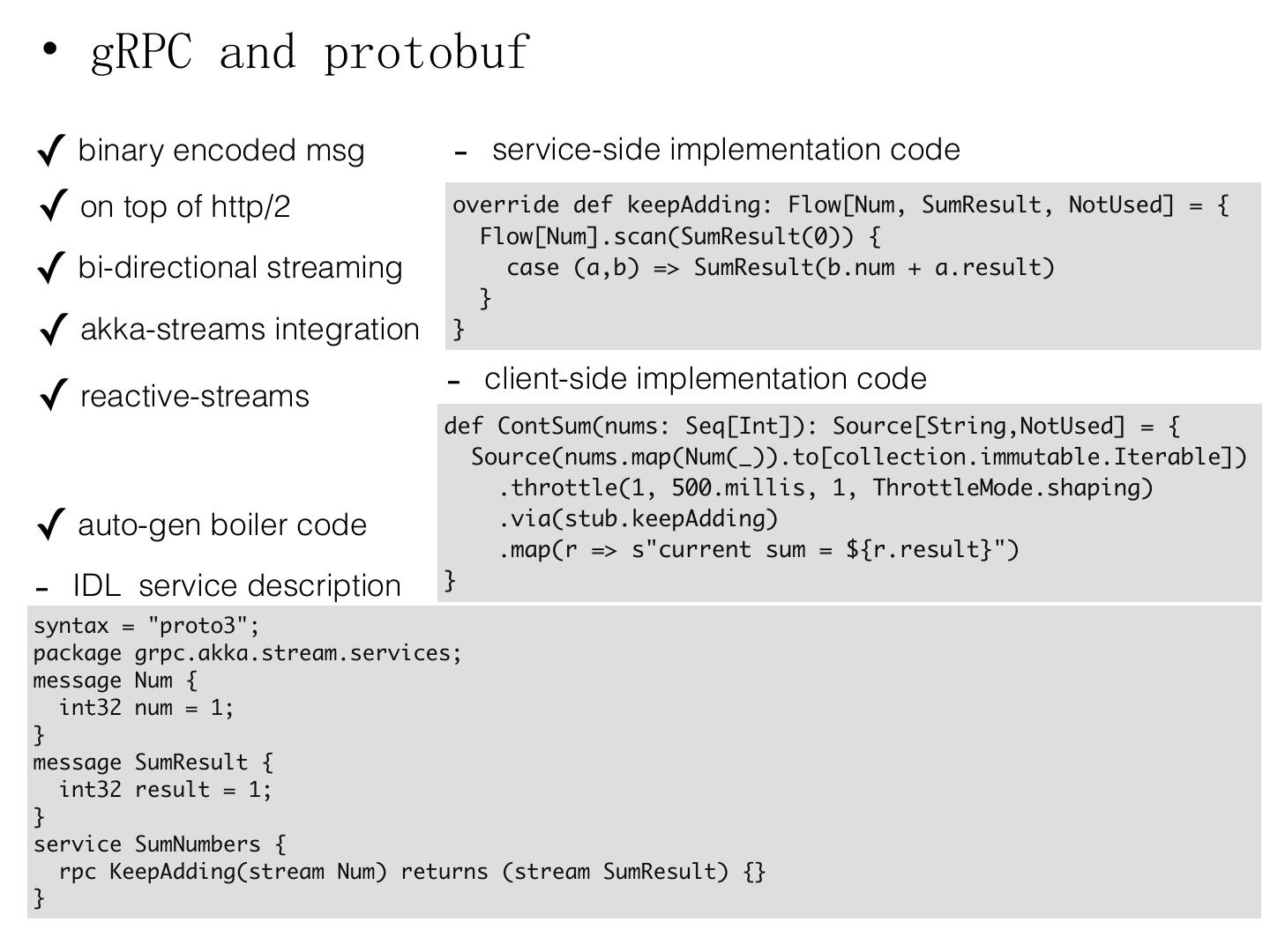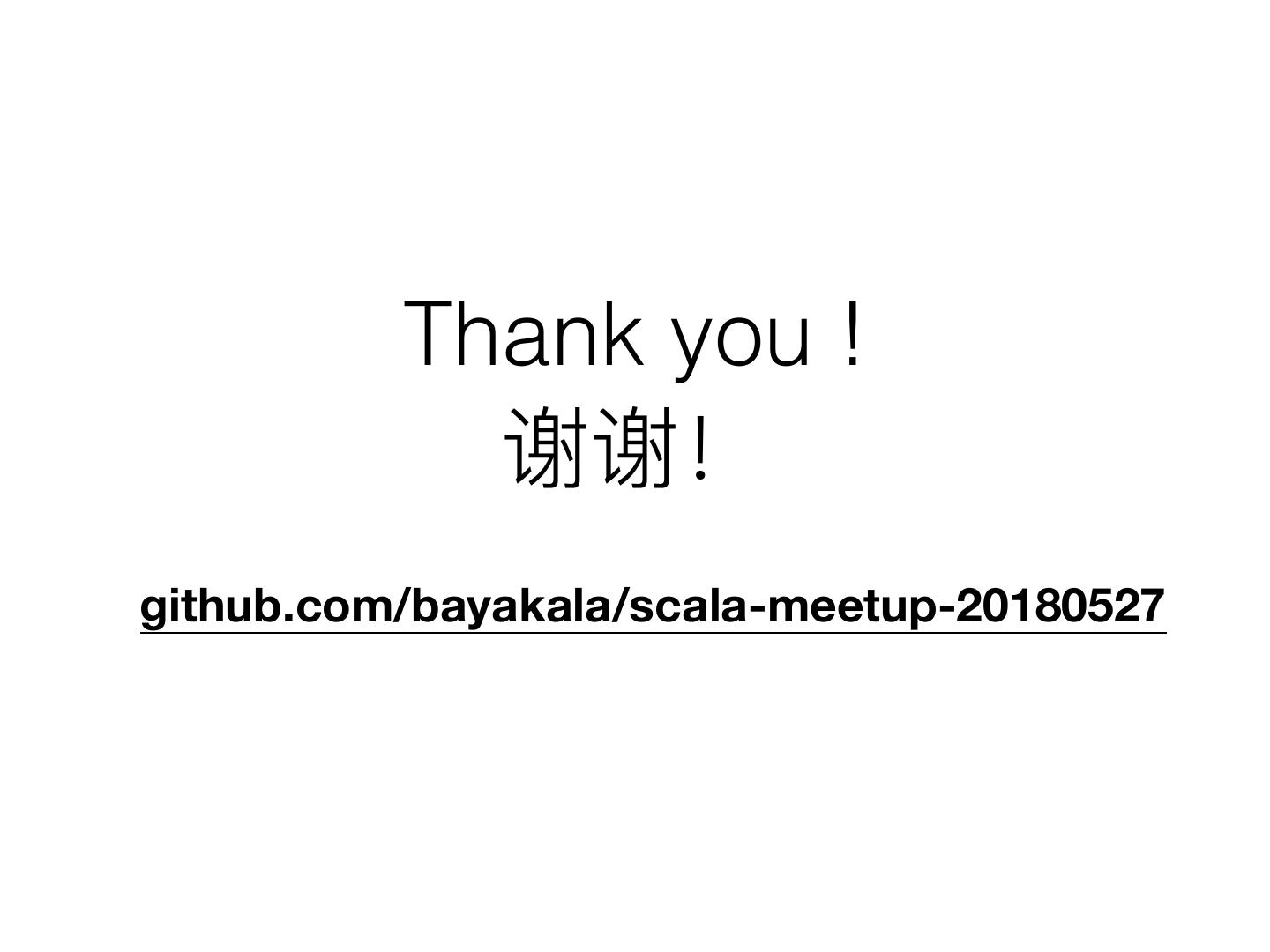- 快召唤伙伴们来围观吧
- 微博 QQ QQ空间 贴吧
- 文档嵌入链接
- 复制
- 微信扫一扫分享
- 已成功复制到剪贴板
5.27meetup-@雪川大虫
展开查看详情
1 .cnblogs.com/tiger-xc/ blog.csdn.net/tiger_xc/ github.com/bayakala/
2 .• 分享提纲 1、type class: ad-hoc and the higher kinded polimorphism 即兴多态及高阶类型参数多态 2、Scala.Future: traps,short-comes.Going to Monic.Task 编程中的陷阱及升级解决方案 Monic.Task 3、programming patterns: program integration in distributed environment 集群环境下系统集成编程模式
3 .• Functional programming my way * 2+years - theories 理论 abstractions 概念 structures 数据结构 combinator libraries 函数库 … * 80% - 在实际工作中没有得到利用 goal: make use of existing tools and libraries like akka, spark … building on top of existing APIs * 10% - used few abstractions like: Future,Traversable immutable construct operations like: for-comp, map,flatMap,fold-aggr, traverse, sequence … * 10% - 用来了解开源软件源代码 everything monad: point,flatMap * in reality: patterns & tricks & caveats 编程模式、技巧、避忌
4 .• Polymorphism - 多态:同⼀一操作作⽤用于不不同的对象,可以有不不同的解释,产⽣生不不同的执⾏行行结果。 就是允许⽅方法重名,同⼀一函数可以施⽤用在不不同类型的对象上。 - 实现⽅方式: 1、overloading 重载 2、inherentance 继承 3、pattern-matching 模式匹配 4、typeclass 即兴多态-ad-hoc polymorphism
5 .• Polymorphism ‣ 重载 overload case class Color(scheme: String) case class Person(name: String) //… object overloading { def tell(color: Color) = s"I'm Color ${color.scheme}" def tell(person: Person)= s"I'm ${person.name}" } import overloading._ tell(Color("RED")) //> res0: String = I'm Color RED tell(Person("John")) //> res1: String = I'm John
6 .• Polymorphism ‣ 继承 inheritance object inheritance { trait AnyThing case class Color(scheme: String) extends AnyThing { def tell: String = s"I'm Color ${scheme}" } case class Person(name: String) extends AnyThing { def tell: String = s"I'm ${name}" } } import inheritance._ Color("RED").tell //> res0: String = I'm Color RED Person("John").tell //> res1: String = I'm John
7 .• Polymorphism ‣ 模式匹配 pattern-matching case class Color(scheme: String) case class Person(name: String) //… object patternmatch { def tell(a: Any): String = a match { case Color(sch) => s"I'm Color ${sch}" case Person(nm) => s"I'm ${nm}" case i: Int => s"I'm a Integer with value $i" } } import patternmatch._ tell(3) //> res0: String = I'm a Integer with value 3 tell(Color("RED")) //> res1: String = I'm Color RED tell(Person("Jonh")) //> res2: String = I'm Jonh
8 .• Polymorphism ‣ typeclass - 即兴多态 ✓ a programming pattern: 1. trait with type parameter 2. function with implicit parameter 3. implicit type instance 4. call function without any type info
9 .• Polymorphism ‣ typeclass - 即兴多态 1. trait with type parameter trait Tellable[A] { def tell(a: A): String } 2. function with implicit parameter def tellAll[A](a: A)(implicit Teller: Tellable[A]): String = Teller.tell(a) 3. create implicit type instance and call the same function case class Color(scheme: String) case class Person(name: String) //… implicit val colorTellable = new Tellable[Color] { def tell(c: Color): String = s"I'm Color ${c.scheme}" } tellAll(Color("Red")) //> res2: String = I'm Color Red implicit val personTellable extends Tellable[Person] { def tell(p: Person): String = s"I'm $p.name" } tellAll(Person("John")) //> res3: String = I'm Person(John).name
10 .• Polymorphism ‣ typeclass - 即兴多态 demo trait Addable[A] { //monoid val mzero: A def madd(x: A, y: A): A } case class Crew(names: List[String]) object Addable { implicit object intAddable extends Addable[Int] { def mzero = 0 def madd(x: Int, y: Int) = x + y } implicit object strAddable extends Addable[String] { val mzero = "" def madd(x: String, y: String) = x + y } implicit object crewAddable extends Addable[Crew] { val mzero = Crew(List()) def madd(x: Crew, y: Crew): Crew = Crew(x.names ++ y.names) } def apply[A](implicit M: Addable[A]): Addable[A] = M } def sum2[A](xa: List[A])(implicit M: Addable[A]): A = xa.foldLeft(M.mzero)(M.madd) sum2(List(1,2,3)) //> res2: Int = 6 sum2(List("ab","c","def")) //> res3: String = abcdef sum2(List(Crew(List("john")), Crew(List(“susan","peter")))) //> res4: Crew = Crew(List(john, susan, peter))
11 .• Polymorphism ‣ typeclass - 即兴多态 demo trait FoldLeft[F[_]] { def foldLeft[A,B](fa: F[A])(b: B)(f: (B,A) => B): B } object FoldLeft { implicit object listFold extends FoldLeft[List] { def foldLeft[A,B](fa: List[A])(b: B)(f: (B,A) => B) = fa.foldLeft(b)(f) } def apply[F[_]](implicit F: FoldLeft[F]): FoldLeft[F] = F } FoldLeft[List].foldLeft(List(1,2,3))(0)(_ + _) //> res7: Int = 6 def sum3[A: Addable,F[_]: FoldLeft](fa: F[A]): A = { val adder = implicitly[Addable[A]] val folder = implicitly[FoldLeft[F]] folder.foldLeft(fa)(adder.mzero)(adder.madd) } //> sum3: [A, F[_]](fa: F[A])(implicit evidence$1: Addable[A], // implicit evidenc$2:FoldLeft[F]) sum3(List(Crew(List("john")), Crew(List("susan","peter")))) //> res8: Crew = Crew(List(john, susan, peter))
12 .• Polymorphism ‣ Method Injection ⽅方法注⼊入 class AddableOp[A](a: A)(implicit M: Addable[A]) { def |+|(y: A) = M.madd(a,y) } implicit def toAddableOp[A: Addable](a: A): AddableOp[A] = new AddableOp[A](a) 3 |+| 2 //> res9: Int = 5 ("hello" |+| " ") |+| "world!" //> res10: String = hello world! implicit class addableOp[A: Addable](a: A) { def |+|(y: A) = implicitly[Addable[A]].madd(a,y) } 3 |+| 2 //> res9: Int = 5 ("hello" |+| " ") |+| "world!" //> res10: String = hello world!
13 .• Polymorphism ‣ Method Injection ⽅方法注⼊入 trait AddableOp[A] { val M: Addable[A] val x: A def |%| = M.mzero def |+|(y: A) = M.madd(x,y) } implicit def toAddableOps[A: Addable](a: A): AddableOp[A] = new AddableOp[A] { val M = implicitly[Addable[A]] val x = a } 3 |+| 2 //> res9: Int = 5 ("hello" |+| " ") |+| "world!" //> res10: String = hello world! 3.|%| //> res11: Int = 0 "hi".|%| //> res12: String = ""
14 .• Higher Kinded Polymorphism in scala ✓ first order parametric polymorphism = generics 泛型 trait iterable[T] { def filter(p: T => Boolean): Iterable[T] def remove(p: T => Boolean): Iterable[T] = filter(x => !p(x)) } - T = type, abstraction over type = first order parametric polymorphism - F[T] = type constructor, higher kind - Abstraction over type constructor = higher kinded polymorphism trait MyIterable[T, F[_]] { def filter(p: T => Boolean): F[T] def remove(p: T => Boolean): F[T] = filter(x => !p(x)) }
15 .• Higher Kinded Polymorphism in scala ✓ duplicated code reduction - 减少重复代码 - first order parametric polymorphism trait iterable[T] { def filter(p: T => Boolean): Iterable[T] def remove(p: T => Boolean): Iterable[T] = filter(x => !p(x)) } trait List[T] extends Iterable[T] { def filter(p: T => Boolean): List[T] def remove(p: T => Boolean): List[T] = filter(x => !p(x)) } - higher kinded polymorphism trait MyIterable[T, F[_]] { def filter(p: T => Boolean): F[T] def remove(p: T => Boolean): F[T] = filter(x => !p(x)) } trait MyList[T] extends MyIterable[T, List]
16 .• Polymorphism ‣ typeclass - 即兴多态 demo trait FoldLeft[F[_]] { def foldLeft[A,B](fa: F[A])(b: B)(f: (B,A) => B): B } object FoldLeft { implicit object listFold extends FoldLeft[List] { def foldLeft[A,B](fa: List[A])(b: B)(f: (B,A) => B) = fa.foldLeft(b)(f) } def apply[F[_]](implicit F: FoldLeft[F]): FoldLeft[F] = F } FoldLeft[List].foldLeft(List(1,2,3))(0)(_ + _) //> res7: Int = 6 def sum3[A: Addable,F[_]: FoldLeft](fa: F[A]): A = { val adder = implicitly[Addable[A]] val folder = implicitly[FoldLeft[F]] folder.foldLeft(fa)(adder.mzero)(adder.madd) } //> sum3: [A, F[_]](fa: F[A])(implicit evidence$1: Addable[A], // implicit evidenc$2:FoldLeft[F]) sum3(List(Crew(List("john")), Crew(List("susan","peter")))) //> res8: Crew = Crew(List(john, susan, peter))
17 .• scala.Future def runMongo(q: query): Future[Int] = ??? def runCassandra(q: query): Future[Int] = ??? def runJdbc(q: query): Future[Int] = ??? runMongo(qryTotalCredit).onComplete { case Success(credit) => //do something ... case Failure(err) => // } //continue doing next things ... val totCredit: Future[Int] = for { mt <- runMongo(qryTotalCredit) ct <- runCassandra(qryTotalCredit) jc <- runJdbc(qryTotalCredit) } yield (mt + ct + jc) println(Await.result(totCredit,3 seconds)) List(runJdbc(qrypart1),runJdbc(qrypart2),runMongo(qry),runCassandra(qry)) .sequence .map {list => list.fold(0)(_ + _)} .onComplete { case Success(sum) => println(s"total credit: $sum") case Failure(e) => println(e.getMessage) } def sequence(F[G[B]): G[F[B]] => List[Future[Int]] => Future[List[Int]]
18 .• scala.Future val futureA = Future { ... } val futureB = Future { ... } // at this point both computation are executed val result = for { a <- futureA b <- futureB } yield () for { a <- Future { ... } // only a's computation is executed b <- Future { ... } // b's computation is executed only if a succeed } yield () - Error ? Exception ? val incrementResult: Future[Unit] = Future.traverse(basket.content) { product => productRepo.incrementProductSells(product.id, product.quantity) }
19 .• scala.Future val total = Future.successful { println("Computing 2 + 2") 2 + 2 } println(total) println(total) Computing 2 + 2 Future(Success(4)) Future(Success(4)) - no referencial transparency,side-effect,impure ⽆无法实现函数组合 val progA:Future[A] = for { b <- readFromB _ <- writeToLocationA(a) r <- getResult } yield r /* location A content updated */ ... /* later */ val progB: Future[B] = for { a <- readFromA val program: Future[Unit] = for { _ <- updateLocationA _ <- progA c <- getResult } _ <- progB ... } yield()
20 .• scala.Future - Require ExecutionConext for compilation def run(query: DBQuery)(implicit executor: ExecutionContext): Future[ResultSet] implicit val executor = scala.concurrent.ExecutionContext.global val result: Future[ResultSet] = db.run(query) trait ProductRepository { def findProduct( productId: ProductId )(implicit executor: ExecutionContext): Future[Option[Product]] def saveProduct( product: Product )(implicit executor: ExecutionContext): Future[Unit] def incrementProductSells( productId: ProductId, quantity: Int )(implicit executor: ExecutionContext): Future[Unit] // More methods ... }
21 .• monix.Task val taskA = Task { debug("Starting taskA”); Thread.sleep(1000); debug(“Finished taskA") } import monix.execution.Scheduler.Implicits.global val futureA = taskA.runAsync trait ProductRepository { def findProduct(productId: ProductId): Task[Option[Product]] def saveProduct(product: Product): Task[Unit] def incrementProductSells(productId: ProductId, quantity: Int): Task[Unit] // More methods ... } val incrementResult: Task[Unit] = Task.traverse(basket.content) { product => productRepo.incrementProductSells(product.id, product.quantity) } // nothing is executed yet // we need to explicitly call runAsync to trigger the execution incrementResult.runAsync val lt: List[Task[Int]] = List(Task(1),Task(2),Task(3)) val tl: CancelableFuture[Int]= Task.gather(lt).runAsync .map {list => list.fold(0)(_ + _)} tl.onComplete(println) //6 // If we change our mind... tl.cancel()
22 .• monix.Task /* ------ taskNow ----*/ val taskNow = Task.now { println("Effect"); "Hello!" } //=> Effect // taskNow: monix.eval.Task[String] = Delay(Now(Hello!)) /* --------taskDelay possible another on thread ------*/ val taskDelay = Task { println("Effect"); "Hello!" } // taskDelay: monix.eval.Task[String] = Delay(Always(<function0>)) taskDelay.runAsync.foreach(println) //=> Effect //=> Hello! // The evaluation (and thus all contained side effects) // gets triggered on each runAsync: taskDelay.runAsync.foreach(println) //=> Effect //=> Hello! object Task { // ... def apply[A](f: => A): Task[A] = fork(eval(f)) def def eval[A](a: => A): Task[A] = Eval(a _) def fork[A](fa: Task[A]): Task[A] = Task.forkedUnit.flatMap(_ => fa) // ... private final val forkedUnit = Async[Unit] { (context, cb) => context.scheduler.executeAsync(() => cb.onSuccess(())) } }
23 .• monix.Task import monix.execution.Scheduler.Implicits.global val total = Task { println("Computing 2 + 2”) ; 2 + 2 } println(total.runSyncUnsafe(1.second)) println(total.runSyncUnsafe(1.second)) Computing 2 + 2 4 Computing 2 + 2 4 val incrementResult: Task[Unit] = Task.traverse(basket.content) { product => productRepo.incrementProductSells(product.id, product.quantity) } // nothing is executed yet // we need to explicitly call runAsync to trigger the execution incrementResult.runAsync val lt: List[Task[Int]] = List(Task(1),Task(2),Task(3)) val tl: CancelableFuture[Int]= Task.gather(lt).runAsync .map {list => list.fold(0)(_ + _)} tl.onComplete(println) //6 // If we change our mind... tl.cancel()
24 .• monix.Task def runAsync(implicit s: Scheduler): CancelableFuture[A] = def runAsync(cb: Callback[A])(implicit s: Scheduler): Cancelable = def runAsyncOpt(implicit s: Scheduler, opts: Options): CancelableFuture[A] = def runAsyncOpt(cb: Callback[A])(implicit s: Scheduler, opts: Options): Cancelable = final def runSyncMaybe(implicit s: Scheduler): Either[CancelableFuture[A], A] = final def runSyncMaybeOpt(implicit s: Scheduler, opts: Options): Either[CancelableFuture[A], A] = final def runSyncUnsafe(timeout: Duration)(implicit s: Scheduler, permit: CanBlock): A = final def runSyncUnsafeOpt(timeout: Duration) (implicit s: Scheduler, opts: Options, permit: CanBlock): A = final def runOnComplete(f: Try[A] => Unit)(implicit s: Scheduler): Cancelable = final def doOnFinish(f: Option[Throwable] => Task[Unit]): Task[A] = final def doOnCancel(callback: Task[Unit]): Task[A] = final def onCancelRaiseError(e: Throwable): Task[A] = final def onErrorRecoverWith[B >: A](pf: PartialFunction[Throwable, Task[B]]): Task[B] = final def onErrorHandleWith[B >: A](f: Throwable => Task[B]): Task[B] = final def onErrorFallbackTo[B >: A](that: Task[B]): Task[B] = final def restartUntil(p: (A) => Boolean): Task[A] = final def onErrorRestart(maxRetries: Long): Task[A] = final def onErrorRestartIf(p: Throwable => Boolean): Task[A] = final def onErrorRestartLoop[S, B >: A](initial: S) (f: (Throwable, S, S => Task[B]) => Task[B]): Task[B] = final def onErrorHandle[U >: A](f: Throwable => U): Task[U] = final def onErrorRecover[U >: A](pf: PartialFunction[Throwable, U]): Task[U] = final class FutureToTask[A](x: => Future[A]) { val taskA = Task.fromFuture(myFuture) def asTask: Task[A] = Task.deferFuture[A(x) } // don't want to execute the future right now val taskB = Task.deferFuture(Future { ... }) final class TaskToFuture[A](x: => Task[A]) { // which is the same as def asFuture: Future[A] = x.runAsync val taskC = Task.defer(Task.fromFuture(Future } { ... }))
25 .• Programming Model ‣ client - server computing - Sa: SQLServer, Oracle … - Cp: jdbc, ado.net …
26 .• Programming Model ‣ client - side programming ✓ traditional transactional recording model ✓ db - for transactional data
27 .• Data Model ‣ I.T system data requirements ✓ JDBC ✓ Cassandra ✓ MongoDB
28 .• Programming Model ‣ distributed solution for big data ✓ JDBC - local transactions ✓ Cassandra - h.a data ✓ MongoDB - big data
29 .• Distributed programming Model ✓ actor-model ✓ gRPC ✓ akka-cluster ✓ protobuf ✓ akka-stream ✓ akka-http




